The website uses Cookies and other relevant technologies to optimize services. To provide you with a better experience, if you continue to use our site, you are consenting with our use of Cookies. The website can also find scenic spots for users. To activate and utilize this AI-based service, please allow the site to acquire your location first.

Tourism Administration, Republic of China (Taiwan)-Taiwan Tourism Administration's Taiwan Tourism Information Website
- Copyright Notice
- Tourism Administration
- Bahasa Melayu
- Bahasa Indonesia
- Travel Guide
Arrival & Departure
- Decrease font size
- Increase font size
Restrictions on Entering Taiwan: National Immigration Agency - Restrictions on Entering Taiwan (Chinese)
For the latest Taiwan entry/exit and quarantine information, please refer to the website of the Taiwan Centers for Disease Control, Ministry of Health and Welfare: Taiwan Center for Disease Control - Border Quarantine
Updated COVID-19 Response Actions
From August 15, 2023:
- If you have suspected symptoms of COVID-19 or receive a positive quick test, please follow the "0+n self-health management" approach. Under this system, no quarantine is required, but such individuals should avoid any unnecessary departures from their residence/hotel room and they should wear a mask at all times when they go out. These procedures should be followed until a negative quick test is received, or 5 days after the most recent positive test.
- Individuals with severe risk factors should seek medical attention as soon as possible.
Foreign travelers may obtain tourist visas if they hold foreign passports or travel documents valid for more than six months in the Republic of China for purposes of sightseeing, business, family visits, study or training, medical treatments, or other legitimate activities. Visa requirements included one completed application form, incoming and outgoing travel tickets, one photo, documents verifying the purpose of the visits, and other relevant documents. The Visitor Visa Application Form can be downloaded from the website of the Bureau of Consular Affairs, Ministry of Foreign Affairs. The completed form should be submitted to an Embassies and Mission Abroad of the Republic of China for visa issuances.
For any further information, please visit the website of the Bureau of Consular Affairs, Ministry of Foreign Affairs . For any further questions about visa application, please contact: e-mail: [email protected] , TEL: +886-2-2343-2888.
- Countries eligible for Visa-Exempt Entry
- Countries eligible for Landing Visas
- Ministry of Foreign Affairs
- ROC Embassies and Missions Abroad
- Taiwan Taoyuan International Airport
Custom hints for Passenger please check Directorate General of Customs' website at Taipei Customs Office .
Traveler Luggage Clearance
Foreign Currencies: value over US$10,000 should be declared. New Taiwan Currency: under NT$100,000. A traveler should apply for the permission to the Central Bank for amounts over such value. There is no restriction on the amount of gold that a traveler can bring out of Taiwan; however, a traveler should declare to the customs office. When carrying out gold valued over US$20,000 out of Taiwan, a traveler should apply for an export permit to the Bureau of Foreign Trade, MOEA (Tel : +886-2-2351-0271 ext. 352) and apply for customs clearance to the customs office.
NB: A traveler should register at the customs office counter when bringing out of Taiwan gold, foreign currencies or new taiwan currency in excess of the said amount. (Tel: +886-3-398-2308, +886-3-398-3222)
Inbound Travelers' Luggage Inspection Flow
Last update time:

Taiwan Travel Restrictions
Traveler's COVID-19 vaccination status
Traveling from the United States to Taiwan
Open for vaccinated visitors
COVID-19 testing
Not required
Not required for vaccinated visitors
Restaurants
Open with restrictions
Recommended in enclosed environments and public transportation.
Taiwan entry details and exceptions
Ready to travel, find flights to taiwan, find stays in taiwan, explore more countries on travel restrictions map, destinations you can travel to now, dominican republic, netherlands, philippines, puerto rico, switzerland, united arab emirates, united kingdom, know when to go.
Sign up for email alerts as countries begin to open - choose the destinations you're interested in so you're in the know.
Can I travel to Taiwan from the United States?
Most visitors from the United States, regardless of vaccination status, can enter Taiwan.
Can I travel to Taiwan if I am vaccinated?
Fully vaccinated visitors from the United States can enter Taiwan without restrictions.
Can I travel to Taiwan without being vaccinated?
Unvaccinated visitors from the United States can enter Taiwan without restrictions.
Do I need a COVID test to enter Taiwan?
Visitors from the United States are not required to present a negative COVID-19 PCR test or antigen result upon entering Taiwan.
Can I travel to Taiwan without quarantine?
Travelers from the United States are not required to quarantine.
Do I need to wear a mask in Taiwan?
Mask usage in Taiwan is recommended in enclosed environments and public transportation.
Are the restaurants and bars open in Taiwan?
Restaurants in Taiwan are open with restrictions. Bars in Taiwan are .
Cookies on GOV.UK
We use some essential cookies to make this website work.
We’d like to set additional cookies to understand how you use GOV.UK, remember your settings and improve government services.
We also use cookies set by other sites to help us deliver content from their services.
You have accepted additional cookies. You can change your cookie settings at any time.
You have rejected additional cookies. You can change your cookie settings at any time.
Entry requirements
This information is for people travelling on a full ‘British citizen’ passport from the UK. It is based on the UK government’s understanding of Taiwan’s current rules for the most common types of travel.
The authorities in Taiwan set and enforce entry rules. If you’re not sure how these requirements apply to you, contact the Taipei Representative Office in London or the Taipei Representative Office in Edinburgh . Entry procedures are being regularly reviewed, so may change at short notice.
COVID-19 rules
There are no COVID-19 testing or vaccination requirements for travellers entering Taiwan.
Epidemic prevention period
When you arrive in Taiwan, the authorities advise that you observe a 7-day self-initiated epidemic prevention period, but you no longer need a negative test result before going out. The authorities are no longer providing free rapid test kits on arrival. You can use your booked accommodation and you can move freely during the 7 days.
This self-health management scheme is provided as guidance by the Central Epidemic Command Center (CECC), and members of the public are free to decide whether to follow it. Please consult the Centres for Disease Control website for the latest guidance.
Passport validity requirements
To enter Taiwan, your passport must have an ‘expiry date’ at least 6 months after the day you arrive.
Check with your travel provider that your passport and other travel documents meet requirements. Renew your passport if you need to.
You will be denied entry if you do not have a valid travel document or try to use a passport that has been reported lost or stolen.
Visa requirements
You can spend up to 90 days in Taiwan without a visa. You can extend this by a further 90 days once you have arrived in Taiwan. You can get more information on entering Taiwan without a visa (‘visa-exempt entry’) from the Taiwan Bureau of Consular Affairs. This applies if you travel:
- as a tourist
- to visit family or friends
- to attend business meetings, cultural or sports events
If you plan to stay in Taiwan for longer than 180 days, you must have a visa before you arrive. If you stay beyond the time given on your visa, you will get a fine and risk being deported from Taiwan.
There are specific rules for naturalised British citizens born in the People’s Republic of China and holders of British National (Overseas) passports wishing to enter under the visa waiver scheme.
You should contact the Taiwan Bureau of Consular Affairs or Taiwan National Immigration Agency for further information.
Applying for a visa
If you are in the UK and need a visa, apply at your nearest Taipei Representative Office . If you are in Taiwan, apply through the Taiwan National Immigration Agency .
Alien Resident Certificate and Alien Permanent Resident Certificate holders
If you already hold a resident certificate, you do not need a visa to enter Taiwan.
If you hold a Youth Mobility Scheme visa for Taiwan , you can apply to switch to a working visa or a visa to study a degree course at undergraduate level or higher.
Submit your application to the Bureau of Consular Affairs for consideration. You can then apply for an Alien Resident Certificate (ARC) at your local National Immigration Agency (NIA) Service Center once your application has been approved. Contact the Bureau of Consular Affairs or National Immigration Agency for further information.
Vaccine requirements
For details about medical entry requirements and recommended vaccinations, see TravelHealthPro’s Taiwan guide .
Customs rules
There are strict rules about goods you can take into or out of Taiwan . You must declare anything that may be prohibited or subject to tax or duty. Contact the Customs Administration for further information.
Animal products
Do not bring animal products into Taiwan without authorisation. If you are caught with any animal products, you may face a heavy fine. Customs officials have increased inspections due to concerns about African Swine Fever Virus in pork products, particularly from the People’s Republic of China.
Bringing money into Taiwan
Declare cash or travellers cheques if the value is higher than 100,000 New Taiwan Dollar (NTD) or 10,000 US dollars. You will get a certified declaration to show you brought it in with you. If you do not, your money could be seized when you leave. Contact the Customs Administration for further information.
International bank transfers can be slow. Most of the ATMs in 7-11 stores accept international cards. Other ATMs may accept them, but not all do.
American Express, Citibank and Thomas Cook branches accept their own-brand travellers cheques. You may need your receipt as well as your passport when you cash them.
Related content
Is this page useful.
- Yes this page is useful
- No this page is not useful
Help us improve GOV.UK
Don’t include personal or financial information like your National Insurance number or credit card details.
To help us improve GOV.UK, we’d like to know more about your visit today. Please fill in this survey (opens in a new tab) .
You are using an outdated browser. Upgrade your browser today or install Google Chrome Frame to better experience this site.
Taiwan Traveler View
Travel health notices, vaccines and medicines, non-vaccine-preventable diseases, stay healthy and safe.
- Packing List
After Your Trip
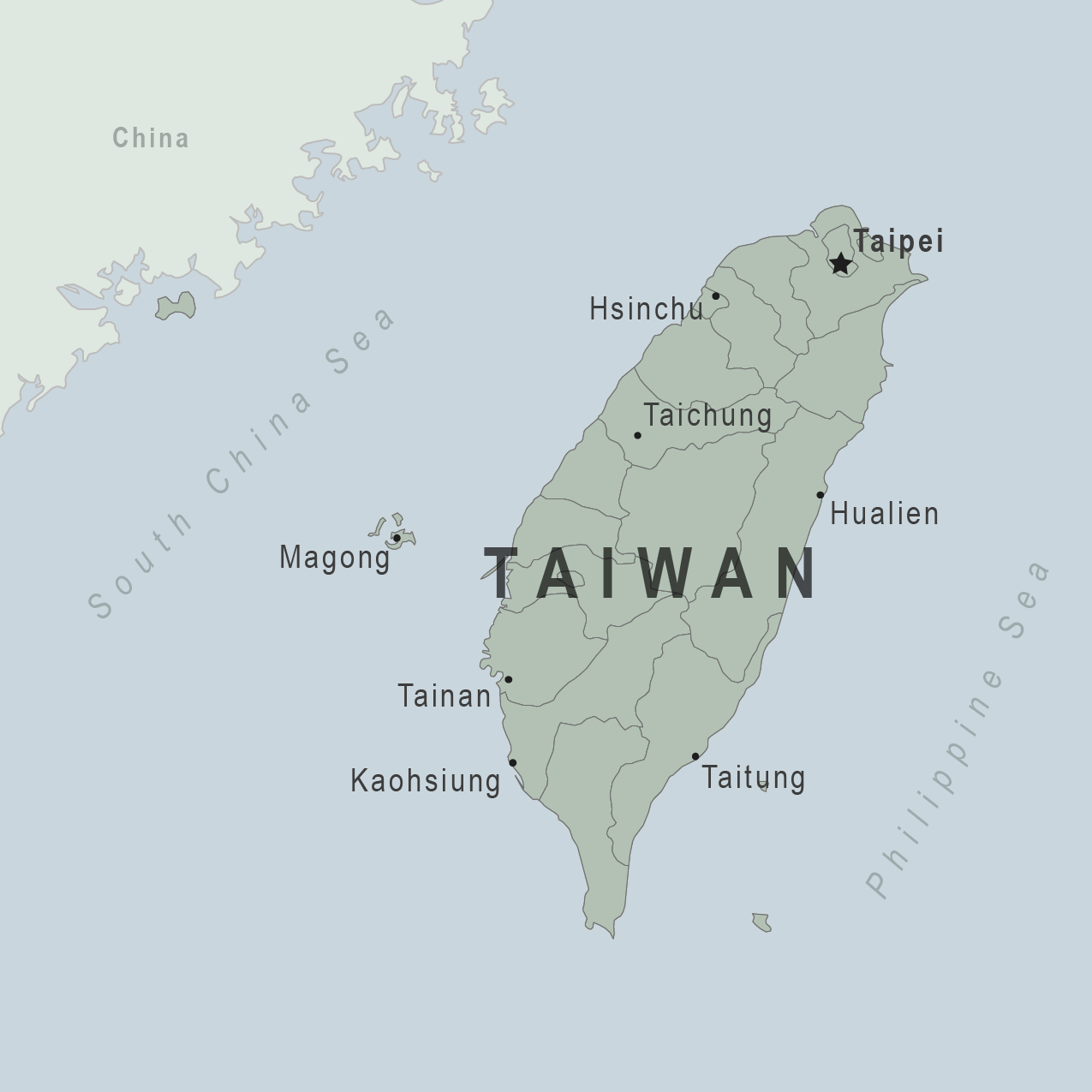
There are no notices currently in effect for Taiwan.
⇧ Top
Check the vaccines and medicines list and visit your doctor at least a month before your trip to get vaccines or medicines you may need. If you or your doctor need help finding a location that provides certain vaccines or medicines, visit the Find a Clinic page.
Avoid contaminated water
Leptospirosis
How most people get sick (most common modes of transmission)
- Touching urine or other body fluids from an animal infected with leptospirosis
- Swimming or wading in urine-contaminated fresh water, or contact with urine-contaminated mud
- Drinking water or eating food contaminated with animal urine
- Avoid contaminated water and soil
- Avoid floodwater
Clinical Guidance
Avoid bug bites.
- Mosquito bite
- Avoid Bug Bites
Airborne & droplet
Avian/bird flu.
- Being around, touching, or working with infected poultry, such as visiting poultry farms or live-animal markets
- Avoid domestic and wild poultry
- Breathing in air or accidentally eating food contaminated with the urine, droppings, or saliva of infected rodents
- Bite from an infected rodent
- Less commonly, being around someone sick with hantavirus (only occurs with Andes virus)
- Avoid rodents and areas where they live
- Avoid sick people
Tuberculosis (TB)
- Breathe in TB bacteria that is in the air from an infected and contagious person coughing, speaking, or singing.
Learn actions you can take to stay healthy and safe on your trip. Vaccines cannot protect you from many diseases in Taiwan, so your behaviors are important.
Eat and drink safely
Food and water standards around the world vary based on the destination. Standards may also differ within a country and risk may change depending on activity type (e.g., hiking versus business trip). You can learn more about safe food and drink choices when traveling by accessing the resources below.
- Choose Safe Food and Drinks When Traveling
- Water Treatment Options When Hiking, Camping or Traveling
- Global Water, Sanitation and Hygiene (WASH)
- Avoid Contaminated Water During Travel
You can also visit the Department of State Country Information Pages for additional information about food and water safety.
Prevent bug bites
Bugs (like mosquitoes, ticks, and fleas) can spread a number of diseases in Taiwan. Many of these diseases cannot be prevented with a vaccine or medicine. You can reduce your risk by taking steps to prevent bug bites.
What can I do to prevent bug bites?
- Cover exposed skin by wearing long-sleeved shirts, long pants, and hats.
- Use an appropriate insect repellent (see below).
- Use permethrin-treated clothing and gear (such as boots, pants, socks, and tents). Do not use permethrin directly on skin.
- Stay and sleep in air-conditioned or screened rooms.
- Use a bed net if the area where you are sleeping is exposed to the outdoors.
What type of insect repellent should I use?
- FOR PROTECTION AGAINST TICKS AND MOSQUITOES: Use a repellent that contains 20% or more DEET for protection that lasts up to several hours.
- Picaridin (also known as KBR 3023, Bayrepel, and icaridin)
- Oil of lemon eucalyptus (OLE) or para-menthane-diol (PMD)
- 2-undecanone
- Always use insect repellent as directed.
What should I do if I am bitten by bugs?
- Avoid scratching bug bites, and apply hydrocortisone cream or calamine lotion to reduce the itching.
- Check your entire body for ticks after outdoor activity. Be sure to remove ticks properly.
What can I do to avoid bed bugs?
Although bed bugs do not carry disease, they are an annoyance. See our information page about avoiding bug bites for some easy tips to avoid them. For more information on bed bugs, see Bed Bugs .
For more detailed information on avoiding bug bites, see Avoid Bug Bites .
Stay safe outdoors
If your travel plans in Taiwan include outdoor activities, take these steps to stay safe and healthy during your trip.
- Stay alert to changing weather conditions and adjust your plans if conditions become unsafe.
- Prepare for activities by wearing the right clothes and packing protective items, such as bug spray, sunscreen, and a basic first aid kit.
- Consider learning basic first aid and CPR before travel. Bring a travel health kit with items appropriate for your activities.
- If you are outside for many hours in heat, eat salty snacks and drink water to stay hydrated and replace salt lost through sweating.
- Protect yourself from UV radiation : use sunscreen with an SPF of at least 15, wear protective clothing, and seek shade during the hottest time of day (10 a.m.–4 p.m.).
- Be especially careful during summer months and at high elevation. Because sunlight reflects off snow, sand, and water, sun exposure may be increased during activities like skiing, swimming, and sailing.
- Very cold temperatures can be dangerous. Dress in layers and cover heads, hands, and feet properly if you are visiting a cold location.
Stay safe around water
- Swim only in designated swimming areas. Obey lifeguards and warning flags on beaches.
- Practice safe boating—follow all boating safety laws, do not drink alcohol if driving a boat, and always wear a life jacket.
- Do not dive into shallow water.
- Do not swim in freshwater in developing areas or where sanitation is poor.
- Avoid swallowing water when swimming. Untreated water can carry germs that make you sick.
- To prevent infections, wear shoes on beaches where there may be animal waste.
Keep away from animals
Most animals avoid people, but they may attack if they feel threatened, are protecting their young or territory, or if they are injured or ill. Animal bites and scratches can lead to serious diseases such as rabies.
Follow these tips to protect yourself:
- Do not touch or feed any animals you do not know.
- Do not allow animals to lick open wounds, and do not get animal saliva in your eyes or mouth.
- Avoid rodents and their urine and feces.
- Traveling pets should be supervised closely and not allowed to come in contact with local animals.
- If you wake in a room with a bat, seek medical care immediately. Bat bites may be hard to see.
All animals can pose a threat, but be extra careful around dogs, bats, monkeys, sea animals such as jellyfish, and snakes. If you are bitten or scratched by an animal, immediately:
- Wash the wound with soap and clean water.
- Go to a doctor right away.
- Tell your doctor about your injury when you get back to the United States.
Consider buying medical evacuation insurance. Rabies is a deadly disease that must be treated quickly, and treatment may not be available in some countries.
Reduce your exposure to germs
Follow these tips to avoid getting sick or spreading illness to others while traveling:
- Wash your hands often, especially before eating.
- If soap and water aren’t available, clean hands with hand sanitizer (containing at least 60% alcohol).
- Don’t touch your eyes, nose, or mouth. If you need to touch your face, make sure your hands are clean.
- Cover your mouth and nose with a tissue or your sleeve (not your hands) when coughing or sneezing.
- Try to avoid contact with people who are sick.
- If you are sick, stay home or in your hotel room, unless you need medical care.
Avoid sharing body fluids
Diseases can be spread through body fluids, such as saliva, blood, vomit, and semen.
Protect yourself:
- Use latex condoms correctly.
- Do not inject drugs.
- Limit alcohol consumption. People take more risks when intoxicated.
- Do not share needles or any devices that can break the skin. That includes needles for tattoos, piercings, and acupuncture.
- If you receive medical or dental care, make sure the equipment is disinfected or sanitized.
Know how to get medical care while traveling
Plan for how you will get health care during your trip, should the need arise:
- Carry a list of local doctors and hospitals at your destination.
- Review your health insurance plan to determine what medical services it would cover during your trip. Consider purchasing travel health and medical evacuation insurance.
- Carry a card that identifies, in the local language, your blood type, chronic conditions or serious allergies, and the generic names of any medications you take.
- Some prescription drugs may be illegal in other countries. Call Taiwan’s embassy to verify that all of your prescription(s) are legal to bring with you.
- Bring all the medicines (including over-the-counter medicines) you think you might need during your trip, including extra in case of travel delays. Ask your doctor to help you get prescriptions filled early if you need to.
Many foreign hospitals and clinics are accredited by the Joint Commission International. A list of accredited facilities is available at their website ( www.jointcommissioninternational.org ).
In some countries, medicine (prescription and over-the-counter) may be substandard or counterfeit. Bring the medicines you will need from the United States to avoid having to buy them at your destination.
Select safe transportation
Motor vehicle crashes are the #1 killer of healthy US citizens in foreign countries.
In many places cars, buses, large trucks, rickshaws, bikes, people on foot, and even animals share the same lanes of traffic, increasing the risk for crashes.
Be smart when you are traveling on foot.
- Use sidewalks and marked crosswalks.
- Pay attention to the traffic around you, especially in crowded areas.
- Remember, people on foot do not always have the right of way in other countries.
Riding/Driving
Choose a safe vehicle.
- Choose official taxis or public transportation, such as trains and buses.
- Ride only in cars that have seatbelts.
- Avoid overcrowded, overloaded, top-heavy buses and minivans.
- Avoid riding on motorcycles or motorbikes, especially motorbike taxis. (Many crashes are caused by inexperienced motorbike drivers.)
- Choose newer vehicles—they may have more safety features, such as airbags, and be more reliable.
- Choose larger vehicles, which may provide more protection in crashes.
Think about the driver.
- Do not drive after drinking alcohol or ride with someone who has been drinking.
- Consider hiring a licensed, trained driver familiar with the area.
- Arrange payment before departing.
Follow basic safety tips.
- Wear a seatbelt at all times.
- Sit in the back seat of cars and taxis.
- When on motorbikes or bicycles, always wear a helmet. (Bring a helmet from home, if needed.)
- Avoid driving at night; street lighting in certain parts of Taiwan may be poor.
- Do not use a cell phone or text while driving (illegal in many countries).
- Travel during daylight hours only, especially in rural areas.
- If you choose to drive a vehicle in Taiwan, learn the local traffic laws and have the proper paperwork.
- Get any driving permits and insurance you may need. Get an International Driving Permit (IDP). Carry the IDP and a US-issued driver's license at all times.
- Check with your auto insurance policy's international coverage, and get more coverage if needed. Make sure you have liability insurance.
- Avoid using local, unscheduled aircraft.
- If possible, fly on larger planes (more than 30 seats); larger airplanes are more likely to have regular safety inspections.
- Try to schedule flights during daylight hours and in good weather.
Medical Evacuation Insurance
If you are seriously injured, emergency care may not be available or may not meet US standards. Trauma care centers are uncommon outside urban areas. Having medical evacuation insurance can be helpful for these reasons.
Helpful Resources
Road Safety Overseas (Information from the US Department of State): Includes tips on driving in other countries, International Driving Permits, auto insurance, and other resources.
The Association for International Road Travel has country-specific Road Travel Reports available for most countries for a minimal fee.
Maintain personal security
Use the same common sense traveling overseas that you would at home, and always stay alert and aware of your surroundings.
Before you leave
- Research your destination(s), including local laws, customs, and culture.
- Monitor travel advisories and alerts and read travel tips from the US Department of State.
- Enroll in the Smart Traveler Enrollment Program (STEP) .
- Leave a copy of your itinerary, contact information, credit cards, and passport with someone at home.
- Pack as light as possible, and leave at home any item you could not replace.
While at your destination(s)
- Carry contact information for the nearest US embassy or consulate .
- Carry a photocopy of your passport and entry stamp; leave the actual passport securely in your hotel.
- Follow all local laws and social customs.
- Do not wear expensive clothing or jewelry.
- Always keep hotel doors locked, and store valuables in secure areas.
- If possible, choose hotel rooms between the 2nd and 6th floors.
Healthy Travel Packing List
Use the Healthy Travel Packing List for Taiwan for a list of health-related items to consider packing for your trip. Talk to your doctor about which items are most important for you.
Why does CDC recommend packing these health-related items?
It’s best to be prepared to prevent and treat common illnesses and injuries. Some supplies and medicines may be difficult to find at your destination, may have different names, or may have different ingredients than what you normally use.
If you are not feeling well after your trip, you may need to see a doctor. If you need help finding a travel medicine specialist, see Find a Clinic . Be sure to tell your doctor about your travel, including where you went and what you did on your trip. Also tell your doctor if you were bitten or scratched by an animal while traveling.
For more information on what to do if you are sick after your trip, see Getting Sick after Travel .
Map Disclaimer - The boundaries and names shown and the designations used on maps do not imply the expression of any opinion whatsoever on the part of the Centers for Disease Control and Prevention concerning the legal status of any country, territory, city or area or of its authorities, or concerning the delimitation of its frontiers or boundaries. Approximate border lines for which there may not yet be full agreement are generally marked.
Other Destinations
If you need help finding travel information:
Message & data rates may apply. CDC Privacy Policy
File Formats Help:
- Adobe PDF file
- Microsoft PowerPoint file
- Microsoft Word file
- Microsoft Excel file
- Audio/Video file
- Apple Quicktime file
- RealPlayer file
- Zip Archive file
- Car Rentals
- Airport Transfers
- Attractions & Tours
- Flight + Hotel
- Destinations
- Trip.com Rewards
Travel to Taiwan – Latest Entry Restrictions and Visa Info

by Trip.com
March 7, 2024
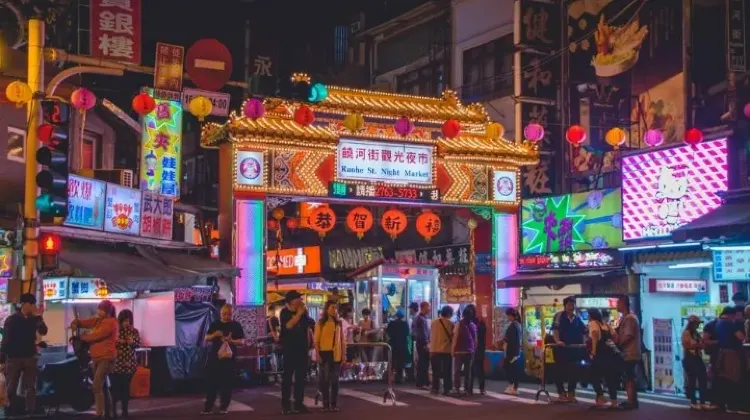
Taiwan is one of the most popular tourist destinations in Asia (Source: Vernon Raineil Cenzon/unsplash)
If you plan to travel to Taiwan, Trip.com is here to present all you need to know about what to do, where to stay, what to eat, and how to get there. Taiwan is a Chinese island (with over 160 small islands ), approximately 160 km or 100 miles from the southeast coast of China’s mainland. The main island of Taiwan is where all the large cities are located, e.g., Taipei (the provincial capital), Kaohsiung, Tainan, and Taichung. The majority of highways and railways are located around the island near the coasts. There are 4 international airports and 5 international seaports in Taiwan.
Visa Information
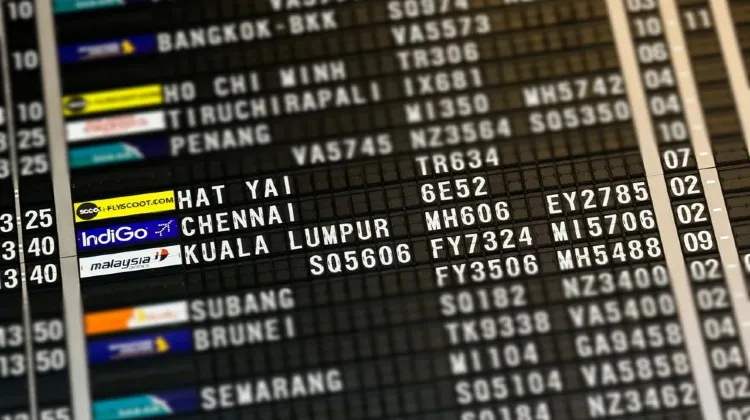
Taiwan's visa-exempt entry scheme has been fully reinstated (Source: Benjamin Wong/unsplash)
– Tourist Visa Application
Currently, E-visa and Landing Visa are temporarily suspended. Requirements for anyone who needs a visitor visa to travel to Taiwan include a passport valid for at least 6 months; a completed application form with 2 photos taken in the past 6 months; an outbound airline ticket or steamship ticket; documents verifying the reason for the visit; and other relevant documents. To obtain the visa, applicants must submit the visa forms to the overseas mission of Taiwan. The consular office will then examine the application and request an interview if necessary.
Countries That Enjoy Visa-free Travel to Taiwan
Travel to taiwan top tips & information, – time zone.
Taiwan observes China Standard Time (CST) which is used all year and is always 8 hours ahead of GMT (Greenwich Mean Time). And there is no Daylight-saving Time clock change.
– Currency and Monetary Exchange Rate
The official currency in Taiwan is Taiwan New Dollar(TWD). The most popular Taiwan New Dollar exchange rate is the TWD to USD rate, which currently stands at TWD1 to USD0.032. Other major currency conversions include TWD1 to 0.22 CNY, TWD1 to EUR0.032, TWD1 to GBP0.0.28, and TWD1 to JPY4.55.
– The Best Time to Visit
Climate in most parts of Taiwan is subtropical, except for the southernmost regions, which are tropical. Summers tend to be long and hot, while winters are short and mild. The best time to travel to Taiwan for comfortable temperatures is from Sep to Nov. There's a chance of typhoons from Jun to Oct. For people who want to travel to Taiwan on a budget, the low season is from Dec to Mar, when vacation packages, flights, and hotels are reasonably cheap.
Flight Status
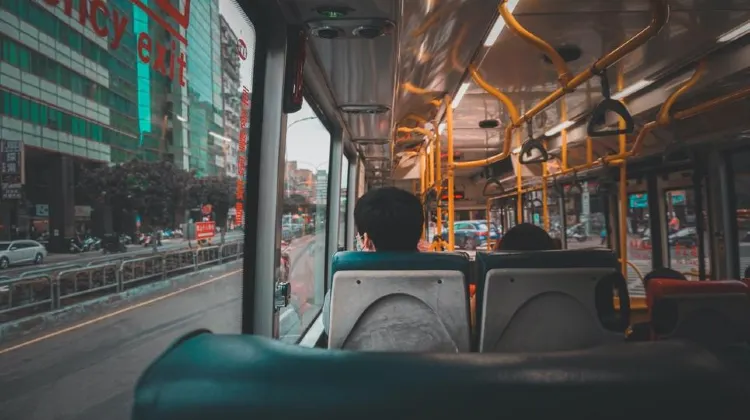
Transfer options between the airport and downtown are taxi, bus, and metro (Source: Lisanto/unsplash)
– Airlines Operating Flights to Taiwan
The best way to travel to Taiwan is by air. A wide range of airlines from around the world offers direct or indirect flights to Taiwan. If you prefer to travel to Taiwan by direct flights from the US, consider flying with Air China, Air Canada, Cathy Pacific, China Airlines, Korean Air, Japan Airlines, and United. Other airlines with flights to Taiwan include Turkish Airlines, Emirates, KLM, Singapore Airlines, and Air New Zealand. If you are planning your travel , check out Trip.com's flight options to Taiwan and other vacation packages.
– Airport Information and Transfers to Downtown
Visitors who travel to Taiwan's provincial capital Taipei by air will land at Taiwan Taoyuan International Airport (TPE), which is situated about 40 km or 25 miles west of Taipei. The TPE is the busiest airport in Taiwan and the 11th busiest airport globally for international passenger traffic. There are currently 2 terminals in operation. For ground transportation options to central Taipei, passengers can choose between taxis, buses (departing from both terminals), Taoyuan airport MRT, and Taiwan High-speed Rail from the Taoyuan HSR station.
For a private transfer between the airport and central Taipei, check out these Trip.com offers
Top 5 Most Popular Cities in Taiwan
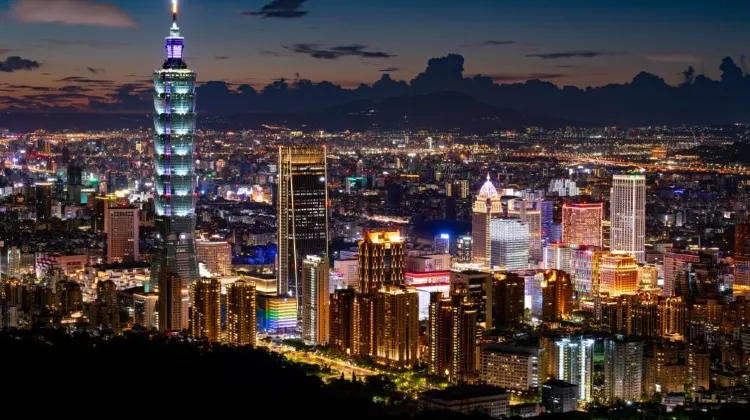
Taipei skyline at night, including Taipei 101
(Source: Timo Volz/unsplash)
Taipei City
As the provincial capital, Taipei is Taiwan's cultural, political, and economic center. Located in the north of the island, nearly one-third of all citizens live in this metro area. Most visitors who travel to Taiwan will first land at Taipei's Taoyuan International Airport, which is about 40 km or 25 miles west of the city. Transportation links include extensive Metro and bus systems as well as local and high-speed trains. Major attractions in Taipei and its surrounding areas include Taipei 101, Chiang Kai-shek Memorial Hall, Longshan Temples, Beitou Hot Springs, National Palace Museum, and various night markets. Anyone interested in a 1-day tour in Taipei with a local, clicks this link on Trip.com . For hotels in Taipei, check out this Trip.com suggestion: Best Five Star Hotels in Taipei .

Kaohsiung is the third most populous city in Taiwan (Source: Dave Weatherall/unsplash)
Kaohsiung City
Located in southern Taiwan, Kaohsiung is a special municipality and the third most populous city on the island. Dating back to the 17th Century, the city transformed itself from a fishing village to the powerhouse of southern Taiwan. In addition, Kaohsiung is also home to the largest harbor on the island (Port of Kaohsiung) and Taiwan's second busiest airport, Kaohsiung International Airport. Major attractions in and around Kaohsiung include 85 Sky Tower, Cijin Island, Lotus Lake, Liuhe Night Market, and Love River. Anyone interested in a 1-day tour around Kaohsiung, clicks this link on Trip.com . For hotels in Kaohsiung, check out this Trip.com suggestion: Best Four Star Hotels in Kaohsiung .

Tainan is home to several temples and historical sites (Source: Eagan Hsu/unsplash)
Tainan City
Located in southern Taiwan, facing the western coast of the Taiwan Strait, Tainan City is also a special municipality and a former provincial capital city. As the oldest urban area on the island, Tainan is a historical city rich in folk culture and traditional architecture. In addition, Tainan is also known for its local delicacies like Dan-tsu noodles, coffin bread, and eel noodles. Major attractions in and around Tainan include Anping Fort, Beiji Temple, Chihkan Tower, Confucius Temple, and Taijiang National Park. For the ultimate Tainan travel guide and 2-day itinerary, click this link on Trip.com . For hotels in Tainan, check out this Trip.com suggestion: Best Hotels in Tainan .
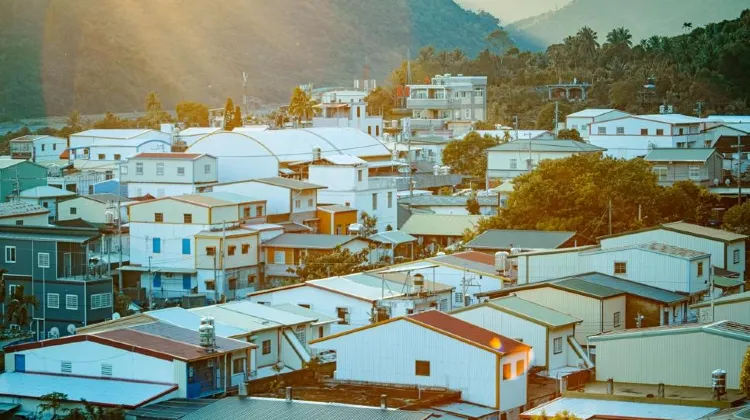
Taichung is the second most populous city in Taiwan (Source: Yeh Che Wei/unsplash)
Taichung City
Meaning "central Taiwan" in Chinese, Taichung City is a special municipality in, as you guessed, central Taiwan. As the second most populous city on the island, Taichung was initially developed from several hamlets of indigenous peoples. Today the city is home to many industries and is well-known for The National Taiwan Museum of Fine Arts and suncakes. Major attractions in and around Taichung include Rainbow Village, Feng Chia Night Market, Hakka Culture Center, and Slow Village. Anyone interested in a 1-day vacation package in Taichung, clicks this link on Trip.com . For hotels in Taichung, check out this Trip.com suggestion: Best Four Star Hotels in Taichung .
Click here to check out Trip.com’s One-day Taichung city Tour Package.
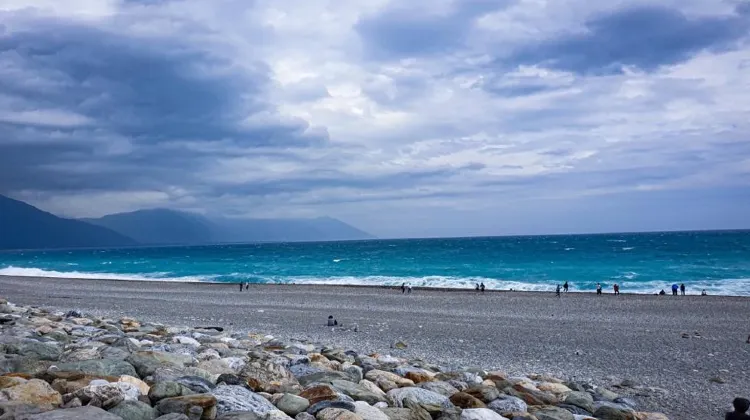
Many tours to nearby parks and attractions leave from Hualien City (Source: Jia Wei Ng/unsplash)
Hualien City
Situated on the east coast of Taiwan, Hualien City is the county seat of Hualien County. Surrounded by mountains, hot springs, dramatic coastlines, and beaches, Hualien City is an excellent base for visits to nearby national parks like the famous Taroko National Park. In addition, Hualien has many unique local good eats like fried egg scallion pancake, bamboo rice, pulled sweet potato and taro, and Hualien mochi. Major attractions in and around Taichung include Qixing Lake, Nanbin Park, Hualien railway Culture Park, and Hualien Cultural and Creative Industries Park. For the ultimate Hualien travel guide and 1-day itinerary, click this link on Trip.com .
For hotels in Hualien, check out this Trip.com suggestion
Most Famous Tourist Attractions in Taiwan

National Palace Museum has an entrance fee of NT$350 (US$11.09)
Taipei National Palace Museum
No. 221, Section 2, Zhi Shan Rd, Shilin District, Taipei City, Taiwan 111
NT$350 (US$11.09)
Click here to check out Trip.com’s One-day Taipei Tour Package.

The best views are from floors 88, 89, 91, and 101 (Source: Thomas Tucker/unsplash)
No. 7, Section 5, Xinyi Road, Xinyi District, Taipei City, Taiwan 110\
General Ticket NT$600 (US$19.01); Skyline 460 NT$3,000 (US$95.07)

Chiang Kai-shek Memorial Hall sits in a 250,000-sq m park
Chiang Kai-shek Memorial Hall
No. 21, Zhongshan S. Rd., Zhongzheng District, Taipei City 10048, Taiwan
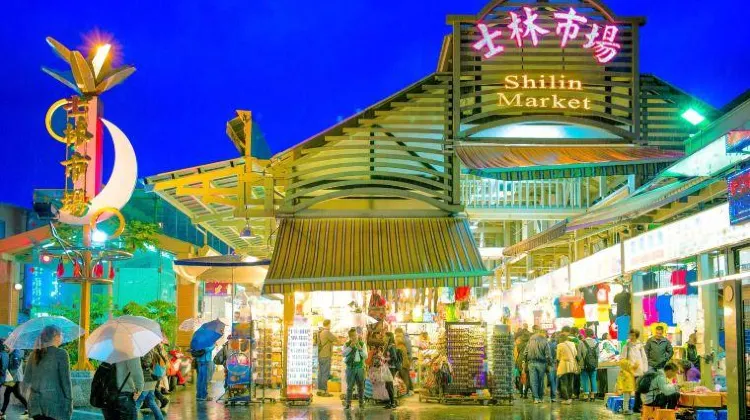
Shilin Night Market opens nightly
Shilin Night Market
No. 101, Jihe Road, Shilin District, Taipei City, Taiwan 111
Free to enter

Sun Moon Lake is 80 km (50 miles) southwest of Taichung
Sun Moon Lake
Yuchi Township, Nantou County, Taiwan 555

Entrance to Taroko National Park is free
Taroko National Park
No. 291, Fushi, Xiulin Township, Hualien County, Taiwan, 972003

Alishan National Scenic Area is home to the Tsou people
Alishan National Scenic Area
605, Alishan Township, Chiayi County, Taiwan
NT$150 (US$4.75) for locals and NT$300 (US$9.51) for foreigners
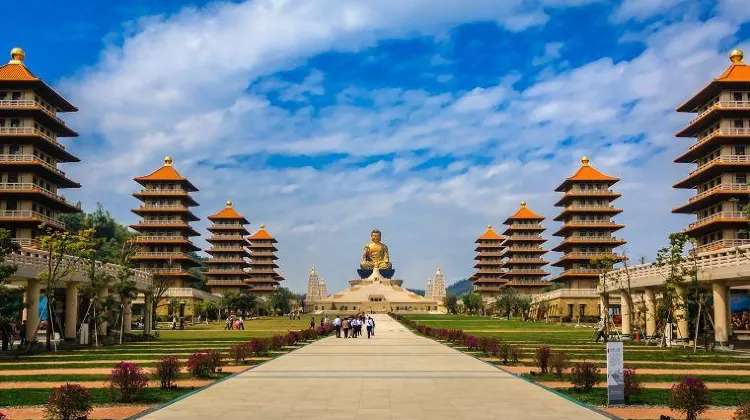
Fo Guang Shan Buddha Museum has been open to the public since 2001
Fo Guang Shan Buddha Museum
No. 153, Xingtian Rd., Dashu Dist., Kaohsiung City 840, Taiwan
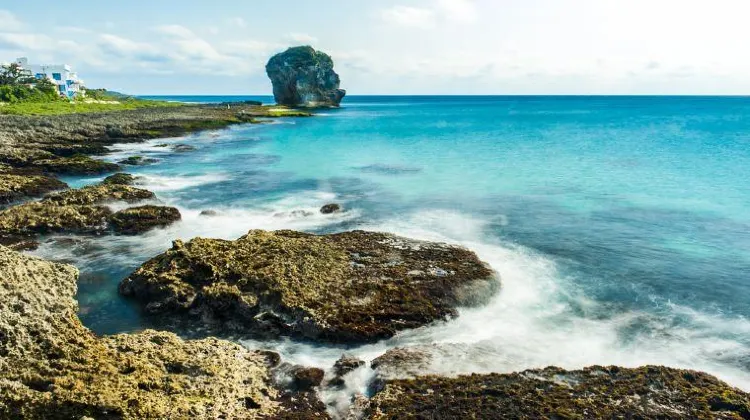
Kenting National Park is the first park of its kind in Taiwan
Kenting National Park
No. 596, Kending Rd., Hengchun Township, Pingtung County, Taiwan, 946009
Free or small entrance fee depending on which site you visit

Jiufen is 40 km (25 miles) east of Taipei city (Source: Y K/unsplash)
Jishan Street, Ruifang District, New Taipei City, Taiwan 22448
Will I need to undergo a quarantine when I travel to Taiwan?
From Oct 13, 2022, all inbound travelers will no longer need to undergo a 3-day quarantine upon arrival. Instead, the self-initiated epidemic prevention will last for 7 days.
Do I need a visa to travel to Taiwan?
Many countries are part of Taiwan's visa-exempt entry scheme. To check if you need a visa to Taiwan, refer to the official Bureau of Consular Affairs website.
What currency can I use when I travel to Taiwan?
The official currency in Taiwan is the New Taiwan Dollar(TWD).
How to travel to Taipei city center from the airport?
Taiwan Taoyuan International Airport to central Taipei transfer options include taxis, buses, and metro. Trip.com also offers private transfer between the airport and the city center.

What's the best way to travel around Taiwan?
You can travel around Taiwan by car or rail as all major cities in Taiwan are connected by the Taiwan Railway Administration network of local and express trains.
- ● Visa Information
- ● Travel to Taiwan Top Tips & Information
- ● Flight Status
- ● Top 5 Most Popular Cities in Taiwan
- ● Most Famous Tourist Attractions in Taiwan
<h3>Trending Searches</h3>
Popular Content
- Best Places to Visit in March
- Valentine's Day
- weekend getaways maryland
- trip to Norway cost
- Weather in Pittsburgh in August
- trip to japan cost
- trip to Manali cost
- weekend getaways in indiana
- Japan Plug Type
- Black Myth Wukong Actual China Locations
- weekend getaways in colorado
- amsterdam trip cost
- weekend getaways in texas
- High Tea Melbourne
Popular Attractions
- Things to Do at Disneyland Paris
- Andamanda Phuket Waterpark Tickets
- Nusa Penida Tickets
- Gardens by the Bay
- Andamanda Phuket Waterpark
- Ping'an Village
- Tianmen Mountain National Forest Park
- Warner Bros. Studio Tour Tokyo - The Making of Harry Potter
- Playa Maya Water Park
- universal studios japan tickets
- universal studios singapore tickets
- N Seoul Tower
- Louvre Museum Tickets
- Everland Tickets
Connectivity
- Morocco eSim
- best Japan travel apps
- Hong Kong SIM Card
- China eSIM 1 Day
- eSIM Vietnam
- Taiwan eSIM
- Hong Kong eSIM 1 Day
Getting Around
- Japan car rental
- Narita Airport to Tokyo
- Suvarnabhumi Airport Transfer
- narita express
- jr tokyo wide pass
- Haruka Express
- Shanghai Airport Transfer
- Kuala Lumpur Airport Transfer
- Customer Support
- Service Guarantee
- More Service Info
- About Trip.com
- Terms & Conditions
- Privacy Statement
- About Trip.com Group
Other Services
- Investor Relations
- Affiliate Program
- List Your Property
- Become a Supplier

Search Smartraveller

Latest update
We advise:
Exercise normal safety precautions in Taiwan.
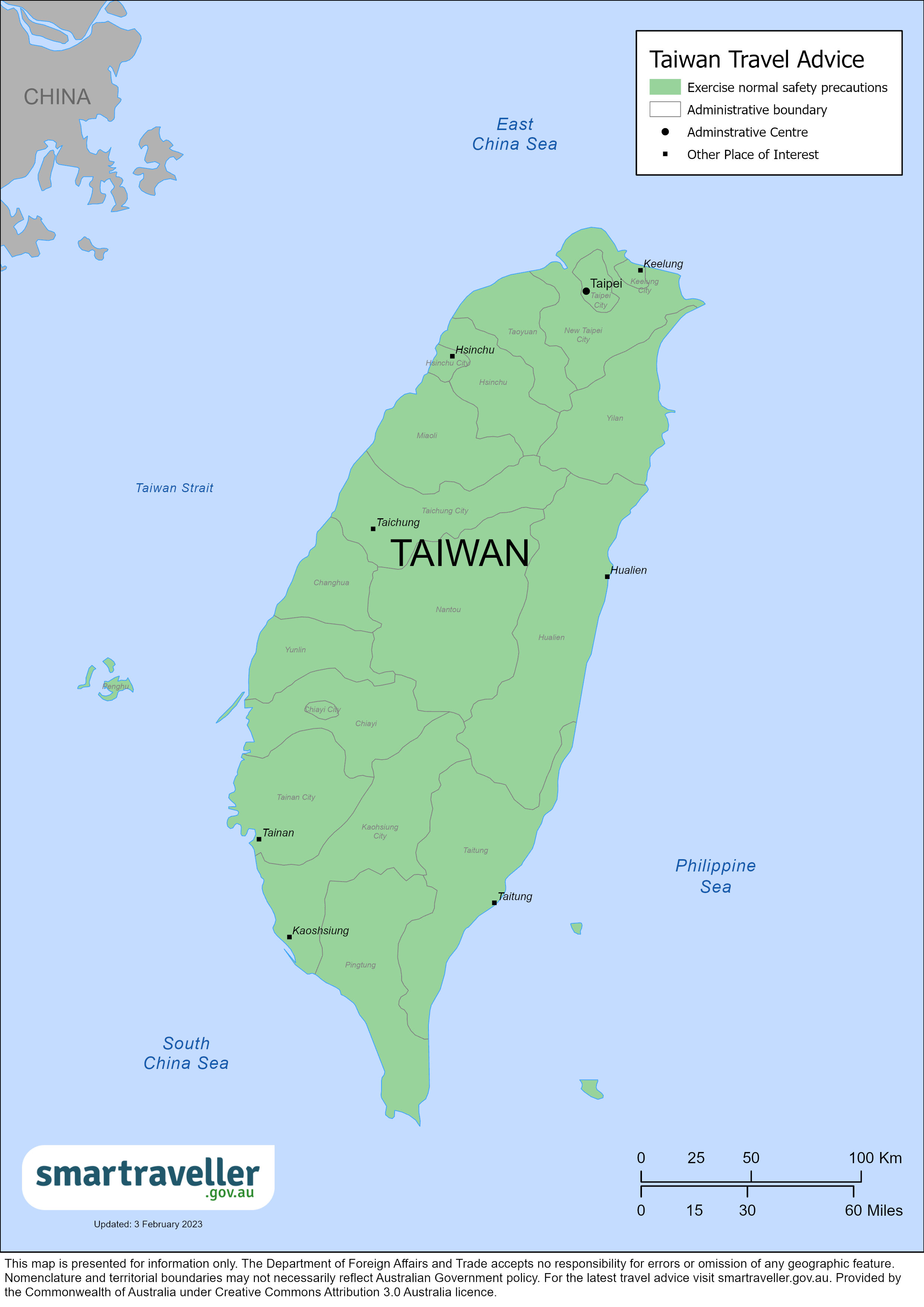
Taiwan (PDF 184.99 KB)
Asia (PDF 2.29 MB)
Local emergency contacts
English language emergency line.
Call 0800 024 111.
Medical emergencies
Call 110 or contact the nearest police station.
Advice levels
Exercise normal safety precautions in Taiwan.
- Disruptions to services and transport continue in some areas following Typhoon Gaemi. Some cities remain affected. Monitor local media for updates and follow instructions issued by local authorities.
- Crime rates are low, including for petty crime. Taxi drivers have sometimes assaulted passengers. However, taxis and other rideshare options are usually safe. Use radio taxis or arrange taxis and other rideshare options online or through your hotel.
- Extortion scams occur. These include minor car accidents and claims of sexual assault at nightclubs. Report suspicious behaviour.
- Protests happen sometimes. They're usually peaceful but can turn violent. Avoid large public gatherings.
- The typhoon season is from May to November. Flooding and mudslides are common. Businesses and government offices close on 'typhoon days'. Follow local advice to prepare for a disaster. Updates on typhoons and other severe weather are available from the Taiwan Central Weather Administration .
- Earthquakes happen often and may disrupt train services. Confirm travel arrangements before travelling. Get advice on being in an earthquake-prone region. Tsunamis also happen. Know the tsunami warning signs and move to high ground straight away. Don't wait for official alerts.
Full travel advice: Safety
- Some prescription medications are illegal in Taiwan. Authorities may jail or fine you if you have them. Before you travel, check Taiwan Customs for limits and documents you'll need.
- Insect-borne diseases such as Dengue, Zika and Japanese encephalitis occur. Ensure your accommodation is insect-proof. Get vaccinated if vaccines are available. If you’re pregnant, discuss your travel plans with your doctor before you travel.
- Waterborne, foodborne and other infectious diseases, such as hand, foot and mouth disease, are common. Drink only boiled or bottled water. Avoid ice cubes. Wash your hands thoroughly and often.
- The standard of public hospitals in major cities is good. Wait times are often long. Some hospitals have English-speaking private clinics, but these can be expensive. You may have to pay up-front, even for emergency care. Ensure your travel insurance covers all medical costs.
Full travel advice: Health
- Don't use or carry illegal drugs, including illegal prescription medication. Penalties for drug offences are severe. They include the death penalty, life in prison, long jail terms and heavy fines.
- Taiwan recognises dual nationality. Taiwanese males older than 18 years must do military service. Some exemptions are available to overseas residents. If you're not exempt, you may have to serve when you arrive. Check Taiwan's Department of Conscription Administration for details. Consular services may be limited for dual nationals who do not enter Taiwan on their Australian passport.
Full travel advice: Local laws
- Taiwan has a visa-exempt entry scheme for nationals of designated countries, including Australia. Refer to Taiwan's Bureau of Consular Affairs website for requirements and restrictions. Entry and exit conditions can change at short notice. You should contact the nearest Taiwan representative office for the latest details.
- If you intend to engage in certain activities in Taiwan, for example, religious work, you'll need to obtain an approval/entry permit or visa. Contact your nearest Taiwan representative office for entry applications. See T aiwan's Bureau of Consular Affairs for further information.
- You'll be screened for high body temperature when you arrive in Taiwan. This is to guard against pandemics such as COVID-19 , SARS and bird flu ( avian influenza ). Depending on your results, you may need more medical tests.
Full travel advice: Travel
Local contacts
- The Consular Services Charter details what we can and can't do to help you overseas.
- For consular help, contact the Australian Office in Taipei .
- To stay up to date with local information, follow the Office's social media accounts.
Full travel advice: Local contacts
Full advice
Civil unrest and political tension.
Demonstrations happen sometimes but are usually peaceful.
Public protests and events that draw large groups of people can turn violent.
To protect yourself during periods of unrest:
- monitor local media for planned or possible action
- avoid rallies and protests
- follow the advice of local authorities
More information:
- Demonstrations and civil unrest
Crime rates are low, including for petty crime.
Taxi drivers have assaulted some passengers. However, taxis and other rideshare options are usually safe.
Some Australians have become victims of extortion scams . Examples include minor car accidents and claims of sexual assault at nightclubs.
To keep yourself safe:
- take care of your belongings, especially in crowded places
- report suspicious behaviour
- use radio taxis, or taxis booked on the internet or through your hotel
Card skimming occurs. Keep an eye on your card when making purchases.
Cyber security
You may be at risk of cyber-based threats during overseas travel to any country. Digital identity theft is a growing concern. Your devices and personal data can be compromised, especially if you’re connecting to Wi-Fi, using or connecting to shared or public computers, or to Bluetooth.
Social media can also be risky in destinations where there are social or political tensions, or laws that may seem unreasonable by Australian standards. Travellers have been arrested for things they have said on social media. Don't comment on local or political events on your social media.
Cyber security when travelling overseas
Kidnapping can happen anywhere, anytime, including in destinations that are typically at lower risk. The Australian Government's longstanding policy is that it doesn't make payments or concessions to kidnappers.
More information:
- Kidnapping
Terrorism is a threat worldwide.
- Terrorist threats
Climate and natural disasters
Taiwan experiences natural disasters and severe weather , including:
- earthquakes
Disruptions to services and transport continue in some areas following Typhoon Gaemi. For a list of affected cities and counties, check the Directorate-General of Personnel Administration.
Typhoons happen in the wet or typhoon season from May to November. Flooding and mudslides are common.
The direction and strength of typhoons can change with little warning. In some areas, shelter from a severe typhoon may not be available to everyone.
If a typhoon is approaching, be aware that:
- flights in and out of affected areas could be delayed or suspended
- available flights may fill quickly
- access to ports could be affected
If a typhoon is approaching, local authorities may declare a 'typhoon day' at very short notice. This means businesses may only open for a short time and government offices may close.
The Australian Office in Taipei may close on typhoon days. See Local contacts .
Authorities announce a 'typhoon day' on local radio and television stations. This includes International Community Radio Taipei (ICRT) , which broadcasts in English.
Updates on typhoons and other severe weather are available from the Taiwan Central Weather Administration . You can also keep up to date by checking:
- World Meteorological Organisation Severe Weather Information Centre
- Joint Typhoon Warning Centre
- Global Disaster Alert and Coordination System
To prepare yourself in case of a typhoon:
- know your hotel's or cruise ship's evacuation plans
- secure your passport in a safe, waterproof location
- take official warnings seriously
- follow the advice of local authorities on preparing for a natural disaster
If there's a typhoon or other natural disaster approaching:
- tune your radio to FM100.7 for English-language updates
- monitor the media, other local information sources and the Global Disaster Alert and Coordination System
- stay in touch with friends and family
- contact your airline for the latest flight information
- contact Taoyuan International Airport , Taipei Songshan Airport , or Kaohsiung International Airport for more information
- contact Maritime and Port Bureau for information on ferries
- check the Directorate-General of Personnel Administration for information on office and school closures
- contact your tour operator to check if services at your planned destinations have been affected
- contact a tour operator to check if services at your planned destinations have been affected
Earthquakes and tsunamis
Earthquakes often occur and may disrupt city and regional train services. Confirm travel arrangements before travelling. Get advice on travelling to and living in an earthquake-prone region.
If you're planning to travel to Taroko or Hualien, check the road conditions before you travel, as access may be affected by the earthquake that occurred on 3 April 2024.
Tsunamis are a risk because of frequent earthquakes in the region.
For more information check out:
- Taiwan’s Central Weather Administration’s Seismological Center
- Taiwan's Emergency Management Information Center 全民防災e點通 (emic.gov.tw) APP for the latest information.
- the US Tsunami Warning Center for information on earthquakes and tsunamis.
If you're near the coast, move immediately to high ground if advised by local authorities or if you:
- feel a strong earthquake that makes it hard to stand up
- feel a weak, rolling earthquake that lasts a minute or more
- see a sudden rise or fall in sea level
- hear loud and unusual noises from the sea
Don't wait for official warnings, such as alarms or sirens. Once on high ground, check local media.
Travel insurance
Get comprehensive travel insurance before you leave.
Your policy needs to cover all overseas medical costs, including medical evacuation. The Australian Government won't pay for these costs.
If you can't afford travel insurance, you can't afford to travel. This applies to everyone, no matter how healthy and fit you are.
If you're not insured, you may have to pay many thousands of dollars up-front for medical care.
- what activities and care your policy covers
- that your insurance covers you for the whole time you'll be away
Physical and mental health
Consider your physical and mental health before you travel, especially if you have an existing medical condition.
See your doctor or travel clinic to:
- have a basic health check-up
- ask if your travel plans may affect your health
- plan any vaccinations you need
Do this at least 8 weeks before you leave.
If you have immediate concerns for your welfare or the welfare of another Australian, call the 24-hour Consular Emergency Centre on +61 2 6261 3305 or contact your nearest Australian Embassy, High Commission or Consulate to discuss counselling hotlines and services available in your location.
- General health advice
- Healthy holiday tips (Healthdirect Australia)
Medications
Not all medication available over the counter or by prescription in Australia is available in other countries. Some may even be considered illegal or a controlled substance, even if prescribed by an Australian doctor.
Some prescription medications are illegal in Taiwan. Authorities may jail or fine you for carrying these medications.
If you plan to take medication, check if it's legal in Taiwan. Take enough legal medicine with you for your trip.
Taiwan Customs gives advice on limits and documents you'll need.
Carry a copy of your prescription or a letter from your doctor stating:
- what the medication is
- your required dosage
- that it's for personal use
Health risks
Insect-borne diseases.
Dengue occurs, especially in the tropical southern and central regions.
Cases of Zika virus were reported in 2016. There's no vaccine available against dengue or Zika virus.
You could also encounter Japanese encephalitis in Taiwan.
To protect yourself from disease:
- make sure your accommodation is insect-proof
- use insect repellent
- wear long, loose, light-coloured clothing
Speak with your doctor about getting vaccinated against Japanese encephalitis before you travel.
If you're pregnant, ask your doctor about possible Zika virus risks.
Other health risks
Hand, foot and mouth disease (HFMD) is common. Sometimes serious outbreaks occur. Outbreaks usually start in March or April and peak in May. However, they can continue until October each year.
HFMD mostly affects children aged under 10 years. However, adult cases occur, especially in young adults.
HFMD spreads through contact with discharges of infected people.
Waterborne, foodborne and other infectious diseases are common. Sometimes serious outbreaks occur.
To protect yourself from illness:
- practice good hygiene, including careful and frequent handwashing
- drink boiled water or bottled water with sealed lids
- avoid ice cubes
Get medical advice if you have a fever or diarrhoea.
Seek medical care if you experience severe symptoms from COVID-19. You can contact the Taiwan Centers for Disease Control helpline on 1922.
- Infectious diseases
Medical care
Medical facilities.
The standard of medical facilities in public hospitals in major cities is good. However, there are often long waiting times.
The medical system can be confusing. Some hospitals have English-speaking private clinics.
Treatment at private clinics and priority care centres is expensive. You may have to pay up-front for medical and dental services, including for emergency care.
You're subject to all local laws and penalties, including those that may appear harsh by Australian standards. Research local laws before travelling.
If you're arrested or jailed, the Australian Government will do what it can to help you under our Consular Services Charter . But we can't get you out of trouble or out of jail.
Penalties for drug offences are severe and include life imprisonment and the death penalty.
Carrying certain prescription drugs can result in heavy fines and long jail sentences. See Health .
- Carrying or using drugs
If you're involved in a legal dispute, you won't be allowed to leave Taiwan until the dispute is settled. This includes minor offences.
You may be detained on arrival if you have an outstanding arrest warrant in Taiwan.
Legal processes can be long. Local authorities won't accept bonds or deposits to guarantee court appearances.
Australian laws
Some Australian criminal laws still apply when you're overseas. If you break these laws, you may face prosecution in Australia.
- Staying within the law and respecting customs
Dual citizenship
Taiwan recognises dual nationality. Taiwanese males aged over 18 must do military service. Some exemptions are available to overseas residents, but you should check this before travelling. If you're not exempt, you may have to serve when you arrive.
If you're a Taiwanese-Australian dual national and you're male, check before you travel.
- Taipei Economic and Cultural Office
- National Conscription Agency
- Dual nationals
Visas and border measures
Every country or territory decides who can enter or leave through its borders. For specific information about the evidence you'll need to enter a foreign destination, check with the nearest embassy, consulate or immigration department of the destination you're entering.
Taiwan has restored the visa-exempt entry scheme for nationals of designated countries, including Australia. Please see T aiwan's Bureau of Consular Affairs website for the visa-exempt entry requirements and restrictions.
You won't need a visa for Taiwan if you meet all these conditions:
- you'll only stay for up to 90 days
- you're visiting for tourism or business
- you have a confirmed return or onward air ticket
- your passport is valid for at least 6 months from the date of your entry
- you're not travelling on an emergency passport
In other situations, you'll need to get a visa before you travel.
Australians can use Taiwan's e-Gate service. To register for e-Gate, visit the e-Gate Enrolment Counters at the airport, located next to the e-Gate lanes at passport control. The registration is valid until 6 months before your passport's expiry date, until you renew your passport, or until you obtain an Alien Resident Card (ARC) in Taiwan. You'll need then to register each trip online to use the gates. More information is available at the e-Gate Enrolment System website.
Working holiday-makers (WHM) must apply for the WHM visa before arriving. WHM visas are also valid as a work permit.
Entry and exit conditions can change. Contact the Taipei Economic and Cultural Office (TECO) for details about visas, currency, customs and quarantine rules.
- National Immigration Agency
Border measures
International transits are permitted at Taiwan's airports. Refer to Taoyuan International Airport or contact your airline or travel agent for more information on transiting Taiwan.
You'll be screened for high body temperature when you arrive. This is to guard against pandemics such as COVID-19 , SARS and bird flu ( avian influenza ). Depending on your results, you may need more medical tests.
Other formalities
If you plan to take prescription or non-prescription medicines with you, check the Taiwan Customs website before you travel. See Health .
If you're planning to work, you need to get a work permit before you start paid or unpaid work. Work permits are usually arranged in Taiwan through your employer.
If you work without a work permit or WHM visa, authorities could fine or deport you.
- Taiwan Workforce Development Agency
- Taiwan Bureau of Consular Affairs
Some countries won't let you enter unless your passport is valid for 6 months after you plan to leave that country. This can apply even if you're just transiting or stopping over.
Some foreign governments and airlines apply the rule inconsistently. Travellers can receive conflicting advice from different sources.
You can end up stranded if your passport is not valid for more than 6 months.
The Australian Government does not set these rules. Check your passport's expiry date before you travel. If you're not sure it'll be valid for long enough, consider getting a new passport .
Lost or stolen passport
Your passport is a valuable document. It's attractive to people who may try to use your identity to commit crimes.
Some people may try to trick you into giving them your passport. Always keep it in a safe place.
If your passport is lost or stolen, tell the Australian Government as soon as possible:
- In Australia, contact the Australian Passport Information Service .
- If you're overseas, contact the nearest Australian embassy or consulate .
Passport with ‘X’ gender identifier
Although Australian passports comply with international standards for sex and gender, we can’t guarantee that a passport showing 'X' in the sex field will be accepted for entry or transit by another country. Contact the nearest embassy, high commission or consulate of your destination before you arrive at the border to confirm if authorities will accept passports with 'X' gender markers.
LGBTQIA+ travellers
The local currency is the New Taiwan Dollar (NTD).
Declare amounts over USD10,000 or equivalent.
ATMs are widely available in cities and provincial centres.
International credit cards are usually accepted in hotels, restaurants and higher-end shops, especially in cities and larger towns.
Local travel
Driving permit.
If you plan to drive in Taiwan, you must get an International Driving Permit (IDP) before you arrive.
You can drive for up to 30 days with an IDP and a current Australian licence.
If you plan to stay longer, apply for an extension at the nearest motor vehicle office in Taiwan.
Check Taiwan’s Highway Bureau for information on how to apply for a Taiwanese Driver's Licence.
Road travel
Roads and vehicles are well-maintained but scooters and motorcycles often weave in and out of traffic, and vehicles might not stop at pedestrian crossings. Look before stepping onto the road.
Heavy rain and typhoons can lead to landslides and road blockages.
Mountain roads are usually winding and narrow. Travellers have been injured in bus accidents on these roads.
To stay safe:
- don't expect traffic to stop at pedestrian crossings or traffic lights — look before stepping onto the road
- assess weather and road conditions before you drive, especially during typhoon season
- take particular care when driving on mountain roads
- Driving or riding
Motorcycles
You need a motorcycle licence, either Taiwanese or international, to hire a motorbike.
Check if your travel insurance policy covers you when riding a motorbike.
Always wear a helmet.
Taxis and other rideshare options are usually safe. However, there have been instances of drivers assaulting passengers.
To minimise risk, use:
- radio taxis
- taxis booked on the internet
- taxis booked through your hotel
Mountain hiking
Permits may be required for entering mountains in Taiwan. Ensure the phone location mode (GPS) on the mobile device is turned on. If you get lost in the mountains, dial 119 and follow the instructions to send your location. Alternatively, you can report the location number shown on a blue plate of the nearest electricity pole.
Public transport
Taiwan has well-developed rail and bus services.
Petty crime happens, so take care of your belongings.
- Transport and getting around safely
Some cruise lines stopover in Taiwan.
- Going on a cruise
DFAT doesn't provide information on the safety of individual commercial airlines or flight paths.
Check Taiwan's air safety profile with the Aviation Safety Network.
Emergencies
Depending on what you need, contact your:
- family and friends
- travel agent
- insurance provider
Medical emergencies (including mountain rescues)
Always get a police report when you report a crime.
Your insurer may have a 24-hour emergency number.
Information for Foreigners
Consular contacts.
Read the Consular Services Charter for what the Australian Government can and can't do to help you overseas.
For consular help, contact the Australian Office in Taipei.
The Australian Office, Taipei
27th and 28th Floor, President International Tower 9-11 Song Gao Road Taipei, 110 Phone: (+886 2) 8725 4100 Fax: (+886 2) 8789 9599 Website: australia.org.tw Email: [email protected] Facebook: facebook.com/australianofficetaipei X: twitter.com/AusOfficeTPE
Check the Australian Office in Taipei website for details about opening hours and any temporary closures.
24-hour Consular Emergency Centre
In a consular emergency, if you can't contact the Australian Office, call the 24-hour Consular Emergency Centre on:
- +61 2 6261 3305 from overseas
- 1300 555 135 in Australia

Travelling to Taiwan?
Sign up to get the latest travel advice updates..
Be the first to know official government advice when travelling.
We've detected unusual activity from your computer network
To continue, please click the box below to let us know you're not a robot.
Why did this happen?
Please make sure your browser supports JavaScript and cookies and that you are not blocking them from loading. For more information you can review our Terms of Service and Cookie Policy .
For inquiries related to this message please contact our support team and provide the reference ID below.
"Your browser does not support JavaScript. If the webpage function is not working properly, please enable the browser JavaScript status."
- Acts and Regulations
- Publications
- Important Diseases
- Travelers’ Health
- Travel Health Notices
- Foreigners’ Health
- Infection Control and Biosafety
- Vaccine-Preventable Diseases Control
- Research & Development
- End TB Special Project
- Preparedness and Response
- Field Epidemiology Training Program
- Research Reports
- Internship(training) Programs Guidelines
- Taiwan National Infectious Disease Statistics System
- Statistics of HIV/AIDS
- Disease Surveillance Express
- Influenza Express
- National Notifiable Disease Surveillance Report
- Weekly Report of Enterovirus Infection
- School-based Surveillance Report
- Taiwan Healthcare-associated infection and Antimicrobial resistance Surveillance System
- Taiwan CDC Open Data Portal
- Taiwan IHR National Focal Point Contact Information
- International Cooperation
- International Conference
- APEC Related Events
- Foreign Visitors
- Relative Resources
- School Visits
- COVID-19 Coronavirus disease 2019(COVID-19)
- Regulations
- Periodicals
- Laws and Regulations
- Yearly Report
- Monthly Report
- Weekly Report 2024
- Weekly Report 2023
- Weekly Report 2022
- Weekly Report 2021
- Weekly Report 2020
- Weekly Report 2019
- Weekly Report 2018
- Weekly Report 2017
- Weekly Report 2016
- Weekly Report 2015
- Weekly Report 2014
- Weekly Report 2013
- Weekly Report 2012
- Weekly Report 2011
- Weekly Report 2010
- Weekly Report 2009
- Weekly Report 2008
- Press Releases
- Current Topics
- Privacy Policy
- Security Policy
- Government Website Open Information Announcement
- Copyright Notice on Health Educational Materials
- Prevention and Control of COVID-19 in Taiwan
- coronavirus disease 2019(COVID-19)
- Press releases
- Travel Health Notices for International Destinations
- Bahasa Indonesia
- Ngôn ngữ Việt Nam
- Bahasa Melayu
- Back ( alt + ← Back)
Regulations concerning short-term business travelers’ applications for shortened quarantine periods in Taiwan
CECC Measures for Following Up on Persons at Risk of Infection
Attached files.
CECC Measures for Following Up on Persons at Risk of Infection(1100514).pdf
CECC Measures for Following Up on Persons at Risk of Infection(1100514).jpg
Self-Health Management Compliance Items and Notice
Announcement of the "Self-Health Management Compliance Items and Notice".
COVID-19: Guidelines for Social Distancing
COVID-19_Guidelines for Social Distancing.pdf
Strategies for preventing COVID-19 spread in communities
Strategies for preventing COVID-19 spread in communities.pdf
Guidelines for large-scale public gatherings in the wake of the COVID-19 outbreak
Preparedness and Contingency Planning in Response to COVID-19 Epidemic
Preparedness and Contingency Planning in Response to COVID-19 Epidemic_0411.pdf
Diseases & Conditions
Programs & campaigns, data & statistics.

- Countries & Regions
- International Organisations (IOs)
- Climate Change
- Counter Terrorism
- Disarmament
- Cybersecurity
- International Peacekeeping
- Singapore's Voluntary National Review
- Small States
- Sustainable Development
- Pedra Branca
- Singapore Universal Periodic Review
- Water Agreements
- Find A Singapore Overseas Mission
- Foreign Representatives To Singapore
- COVID-19 Information
- Travel Tips
- Visa Information
- I Need Help Overseas
- Passport Matters
- Legalisation of Documents
- Travel Advisories and Notices
- Useful links
- Press Statements, Transcripts & Photos
- Announcements and Highlights
- Experience Singapore
- Foreign Service Officer (Functional and Corporate)
- Foreign Service Officer (Political and Economic)
- Foreign Service Administration Specialist
- Job Opportunities
- Pre-University
- Undergraduate
- Foreign Service Scholarships
- Recruitment
- Scholarship
- Reach.gov.sg
Expand All | Collapse All
Entry and Exit
With effect from 29 September 2022, Singaporeans can enter Taiwan visa-free for durations of stay up to 30 days. Pre-departure PCR tests are not required, and there are no vaccination requirements to enter Taiwan.
Effective from 00:00, 13 October 2022, quarantine is no longer required, and travellers are expected to follow 7 days of self-health management instead. Travellers can refer to the notice at https://www.cdc.gov.tw/En/Bulletin/Detail/nEBLnOPooDYFy_CBJqfWvg?typeid=158 for more information.
Travellers can contact the Taipei Representative Office (TRO) in Singapore for further queries regarding entry requirements. You can refer to the TRO’s website at https://www.roc-taiwan.org/sg/ , or reach out to the TRO at +65 6500-0100 or [email protected] .
As entry requirements often change at short notice due to COVID-19 developments, we advise that you closely monitor the website of Taiwan Centres for Disease Control at http://www.cdc.gov.tw/En for the latest updates or call them at +886 800 001 922 or 1922 (in Taiwan only). We advise you to contact your travel agency to ensure that you have accurate information prior to departure.
Travellers entering or leaving Taiwan are required to declare the following items at customs:
1. Cash in New Taiwan dollars of more than NT$100,000
2. Chinese yuan (renminbi) of more than RMB$20,000
3. Foreign currencies valued at more than US$10,000
4. Negotiable securities with face value at more than US$10,000
5. Gold valued at more than US$20,000
6. Diamonds, precious stones and platinum not intended for personal use and valued at more than NT$500,000 in total
Non-declaration or false declaration of any of these controlled items will result in confiscation of the item or a fine equivalent to the undeclared amount. The same rules apply to these items delivered as general cargo, express consignments or postal parcels.
The import of pork products from Singapore by mail or hand-carry is strictly prohibited. Offenders will be subjected to a fine of NT$200,000 and repeat offenders will be subjected to a fine of NT$1 million. Travellers who cannot pay the fine will be denied entry and repatriated.
Safety and Security
The crime rate in Taiwan is low. Nonetheless, petty crime and scams involving foreigners do occur. Avoid confrontation and contact the police if necessary. To drive in Taiwan you need an international driving permit. Travellers are advised to familiarise themselves with local traffic rules and road conditions. Public demonstrations in Taiwan are generally peaceful. Travellers should nonetheless avoid areas where demonstrations are taking place,
If you are arrested or detained, you may request that the police notify the Singapore Trade Office in Taipei. Foreigners accused of crimes are not permitted to leave Taiwan while legal proceedings are ongoing. Legal proceedings can be lengthy.
Additional Information
Taiwan experiences earthquakes and typhoons. Alerts and forecasts are issued by the Central Weather Bureau, and are available in English and Chinese.
General Travel Advice
Overseas Travel – Be Informed & Be Safe [Updated on 5 February 2024]
Singaporeans planning overseas travel are reminded to take the necessary precautions, including being prepared to deal with accidents, natural disasters or terrorist attacks. Singaporeans are also reminded to be familiar with your destination’s local laws, customs, and COVID-19 regulations.
Demonstrations do occur in major cities across the world. Such demonstrations can sometimes escalate into violence. It is important for Singaporeans to keep abreast of local news, avoid any protests or demonstrations and heed the advice of the local authorities.
When participating in outdoor leisure activities overseas, Singaporeans should be mindful that certain sporting activities, especially in open seas, may carry risks. Besides ensuring that one has the physical competencies and appropriate condition to undertake the activity, every effort should be made to ascertain if the trip organiser or guide is reliable and competent, and that appropriate safety and contingency plans are in place. When in doubt, Singaporeans should consult the relevant professional bodies or sporting associations for specific advice.
For those planning to travel, here are some tips:
Before travelling
- Familiarise yourself with our network of overseas missions.
- Purchase comprehensive travel insurance and be familiar with the terms and coverage.
- Equip yourself with research about your destination’s entry requirements, current situation, local laws and customs.
- eRegister with us on our website ( www.mfa.gov.sg ) so that we may reach out to you during an emergency.
While travelling
- Always take care of your personal safety, remain vigilant and monitor local weather news, advisories, and security developments.
- Exercise caution around large gatherings and avoid locations known for demonstrations or disturbances.
- Be prepared for possible delays and last-minute changes in travel plans especially during unforeseen events such as natural disasters, social unrest or terror attacks.
- Stay connected with your friends and family. Inform them of your whereabouts and provide them with your overseas contact details.
- In the event that you require consular assistance, please contact the nearest Singapore Overseas Mission or call the Ministry of Foreign Affairs Duty Office at +65 6379 8800/+65 6379 8855.
Advisory: Email Scams
There have been reports of individuals receiving scam emails/messages purportedly sent from friends in distress overseas. These emails/messages typically originate from an email address/social media known to the receiver bearing claims of the sender getting into trouble overseas and urgently requesting financial assistance. The sender would also claim to have approached a Singapore Embassy/Consulate and the local Police for help to no avail.
MFA takes the safety of all Singaporeans very seriously. Singaporeans in distress approaching our Overseas Missions for assistance will be rendered with all necessary consular assistance. If you receive such emails/messages from purported friends seeking funds transfers, we strongly advise you to call them first to verify the authenticity of the emails/messages before responding to their request. It is also not advisable to give out any personal information such as NRIC/passport numbers, address, telephone number, etc. Any form of reply, even one of non-interest, could result in more unsolicited emails. Members of the public who suspect that they have fallen prey to such scams should report the matter to the Police immediately. Should Singaporeans abroad require consular assistance, they can contact the nearest Singapore Overseas Mission or call the Ministry of Foreign Affairs 24-hr Duty Office at +65 6379 8800/+65 6379 8855.
The Ministry of Foreign Affairs is a ministry of the Government of Singapore responsible for conducting and managing diplomatic relations between Singapore and other countries and regions.
Travel Page
- Skip to main content
- Skip to "About this site"
Language selection
Search travel.gc.ca.
Help us to improve our website. Take our survey !
COVID-19: travel health notice for all travellers
Taiwan travel advice
Latest updates: The Health section was updated - travel health information (Public Health Agency of Canada)
Last updated: August 7, 2024 13:58 ET
On this page
Safety and security, entry and exit requirements, laws and culture, natural disasters and climate, taiwan - take normal security precautions.
Take normal security precautions in Taiwan.
Back to top
The crime rate is low in Taiwan.
Violent crime is rare.
Petty crime, such as pickpocketing and purse snatching, occurs.
Ensure that your belongings, including your passport and other travel documents, are secure at all times.
Credit card and ATM fraud
Credit card and ATM fraud occurs. Be cautious when using debit or credit cards:
- pay careful attention when your cards are being handled by others
- use ATMs located in well-lit public areas or inside a bank or business
- avoid using card readers with an irregular or unusual feature
- cover the keypad with one hand when entering your PIN
- check for any unauthorized transactions on your account statements
Telephone or email scams
Foreigners have received calls or emails from scammers claiming to be local authorities or financial institutions. The scammer may try to collect personal information or request a fund transfer to resolve alleged administrative or customs issues.
- Don’t send money to unknown individuals
- Don’t share personal information over the phone or via email
Overseas fraud
Road safety
Road conditions and road safety can vary greatly throughout Taiwan.
Driving conditions may be hazardous during the rainy season. Some roads can become impassable due to heavy rain and landslides.
Motorcycle and scooter drivers don’t respect traffic laws. They are extremely reckless.
- Avoid driving or riding motorcycles in Taiwan, even if you are an experienced motorcyclist
- Be particularly careful when walking or biking
- Always use elevated walkways or pedestrian bridges whenever possible
Latest news - Directorate General of Highways
Demonstrations
Demonstrations take place from time to time. Even peaceful demonstrations can turn violent at any time. They can also lead to disruptions to traffic and public transportation.
- Avoid areas where demonstrations and large gatherings are taking place
- Follow the instructions of local authorities
- Monitor local media for information on ongoing demonstrations
Mass gatherings (large-scale events)
We do not make assessments on the compliance of foreign domestic airlines with international safety standards.
Information about foreign domestic airlines
Every country or territory decides who can enter or exit through its borders. The Government of Canada cannot intervene on your behalf if you do not meet your destination’s entry or exit requirements.
We have obtained the information on this page from the authorities of Taiwan. It can, however, change at any time.
Verify this information with the Foreign Representatives in Canada .
Entry requirements vary depending on the type of passport you use for travel.
Before you travel, check with your transportation company about passport requirements. Its rules on passport validity may be more stringent than the country’s entry rules.
Regular Canadian passport
Your passport must be valid for at least 6 months beyond the date you expect to leave Taiwan.
Passport for official travel
Different entry rules may apply.
Official travel
Passport with “X” gender identifier
While the Government of Canada issues passports with an “X” gender identifier, it cannot guarantee your entry or transit through other countries. You might face entry restrictions in countries that do not recognize the “X” gender identifier. Before you leave, check with the closest foreign representative for your destination.
Other travel documents
Different entry rules may apply when travelling with a temporary passport or an emergency travel document. Before you leave, check with the closest foreign representative for your destination.
Useful links
- Foreign Representatives in Canada
- Canadian passports
Tourist visa: not required for stays up to 90 days Business visa: not required for stays up to 90 days Student visa: required Working visa: required
As a Canadian, you don’t require a tourist or business visa for stays up to 90 days. Once in Taiwan, you may extend your stay for an additional 90 days. You must place your request with the Taiwanese Bureau of Consular Affairs.
If you plan to stay in Taiwan for more than 180 days, you must obtain a visa before arrival.
Information on visas - Ministry of Foreign Affairs of Taiwan
Other entry requirements
Customs officials may ask you to show them a return or onward ticket and proof of sufficient funds to cover your stay.
Health entry requirements
You may be subject to a non-invasive temperature screening upon arrival at international ports and airports.
If you have flu-like symptoms such as fever, muscle aches, lethargy and sore throat, you may be sent to the hospital for further checks and treatment.
- Children and travel
Learn more about travelling with children .
Yellow fever
Learn about potential entry requirements related to yellow fever (vaccines section).
Relevant Travel Health Notices
- Global Measles Notice - 13 March, 2024
- COVID-19 and International Travel - 13 March, 2024
This section contains information on possible health risks and restrictions regularly found or ongoing in the destination. Follow this advice to lower your risk of becoming ill while travelling. Not all risks are listed below.
Consult a health care professional or visit a travel health clinic preferably 6 weeks before you travel to get personalized health advice and recommendations.
Routine vaccines
Be sure that your routine vaccinations , as per your province or territory , are up-to-date before travelling, regardless of your destination.
Some of these vaccinations include measles-mumps-rubella (MMR), diphtheria, tetanus, pertussis, polio, varicella (chickenpox), influenza and others.
Pre-travel vaccines and medications
You may be at risk for preventable diseases while travelling in this destination. Talk to a travel health professional about which medications or vaccines may be right for you, based on your destination and itinerary.
Yellow fever is a disease caused by a flavivirus from the bite of an infected mosquito.
Travellers get vaccinated either because it is required to enter a country or because it is recommended for their protection.
- There is no risk of yellow fever in this country.
Country Entry Requirement*
- Proof of vaccination is not required to enter this country.
Recommendation
- Vaccination is not recommended.
* It is important to note that country entry requirements may not reflect your risk of yellow fever at your destination. It is recommended that you contact the nearest diplomatic or consular office of the destination(s) you will be visiting to verify any additional entry requirements.
About Yellow Fever
Yellow Fever Vaccination Centres in Canada
There is a risk of hepatitis A in this destination. It is a disease of the liver. People can get hepatitis A if they ingest contaminated food or water, eat foods prepared by an infectious person, or if they have close physical contact (such as oral-anal sex) with an infectious person, although casual contact among people does not spread the virus.
Practise safe food and water precautions and wash your hands often. Vaccination is recommended for all travellers to areas where hepatitis A is present.
Measles is a highly contagious viral disease. It can spread quickly from person to person by direct contact and through droplets in the air.
Anyone who is not protected against measles is at risk of being infected with it when travelling internationally.
Regardless of where you are going, talk to a health care professional before travelling to make sure you are fully protected against measles.
Japanese encephalitis is a viral infection that can cause swelling of the brain. It is spread to humans through the bite of an infected mosquito. Risk is very low for most travellers. Travellers at relatively higher risk may want to consider vaccination for JE prior to travelling.
Travellers are at higher risk if they will be:
- travelling long term (e.g. more than 30 days)
- making multiple trips to endemic areas
- staying for extended periods in rural areas
- visiting an area suffering a JE outbreak
- engaging in activities involving high contact with mosquitos (e.g., entomologists)
Hepatitis B is a risk in every destination. It is a viral liver disease that is easily transmitted from one person to another through exposure to blood and body fluids containing the hepatitis B virus. Travellers who may be exposed to blood or other bodily fluids (e.g., through sexual contact, medical treatment, sharing needles, tattooing, acupuncture or occupational exposure) are at higher risk of getting hepatitis B.
Hepatitis B vaccination is recommended for all travellers. Prevent hepatitis B infection by practicing safe sex, only using new and sterile drug equipment, and only getting tattoos and piercings in settings that follow public health regulations and standards.
Coronavirus disease (COVID-19) is an infectious viral disease. It can spread from person to person by direct contact and through droplets in the air.
It is recommended that all eligible travellers complete a COVID-19 vaccine series along with any additional recommended doses in Canada before travelling. Evidence shows that vaccines are very effective at preventing severe illness, hospitalization and death from COVID-19. While vaccination provides better protection against serious illness, you may still be at risk of infection from the virus that causes COVID-19. Anyone who has not completed a vaccine series is at increased risk of being infected with the virus that causes COVID-19 and is at greater risk for severe disease when travelling internationally.
Before travelling, verify your destination’s COVID-19 vaccination entry/exit requirements. Regardless of where you are going, talk to a health care professional before travelling to make sure you are adequately protected against COVID-19.
The best way to protect yourself from seasonal influenza (flu) is to get vaccinated every year. Get the flu shot at least 2 weeks before travelling.
The flu occurs worldwide.
- In the Northern Hemisphere, the flu season usually runs from November to April.
- In the Southern Hemisphere, the flu season usually runs between April and October.
- In the tropics, there is flu activity year round.
The flu vaccine available in one hemisphere may only offer partial protection against the flu in the other hemisphere.
The flu virus spreads from person to person when they cough or sneeze or by touching objects and surfaces that have been contaminated with the virus. Clean your hands often and wear a mask if you have a fever or respiratory symptoms.
In this destination, rabies may be present in some wildlife species, including bats. Rabies is a deadly disease that spreads to humans primarily through bites or scratches from an infected animal.
If you are bitten or scratched by an animal while travelling, immediately wash the wound with soap and clean water and see a health care professional.
Before travel, discuss rabies vaccination with a health care professional. It may be recommended for travellers who will be working directly with wildlife.
Safe food and water precautions
Many illnesses can be caused by eating food or drinking beverages contaminated by bacteria, parasites, toxins, or viruses, or by swimming or bathing in contaminated water.
- Learn more about food and water precautions to take to avoid getting sick by visiting our eat and drink safely abroad page. Remember: Boil it, cook it, peel it, or leave it!
- Avoid getting water into your eyes, mouth or nose when swimming or participating in activities in freshwater (streams, canals, lakes), particularly after flooding or heavy rain. Water may look clean but could still be polluted or contaminated.
- Avoid inhaling or swallowing water while bathing, showering, or swimming in pools or hot tubs.
Travellers' diarrhea is the most common illness affecting travellers. It is spread from eating or drinking contaminated food or water.
Risk of developing travellers' diarrhea increases when travelling in regions with poor standards of hygiene and sanitation. Practise safe food and water precautions.
The most important treatment for travellers' diarrhea is rehydration (drinking lots of fluids). Carry oral rehydration salts when travelling.
Typhoid is a bacterial infection spread by contaminated food or water. Risk is higher among children, travellers going to rural areas, travellers visiting friends and relatives or those travelling for a long period of time.
Travellers visiting regions with a risk of typhoid, especially those exposed to places with poor sanitation, should speak to a health care professional about vaccination.
Insect bite prevention
Many diseases are spread by the bites of infected insects such as mosquitoes, ticks, fleas or flies. When travelling to areas where infected insects may be present:
- Use insect repellent (bug spray) on exposed skin
- Cover up with light-coloured, loose clothes made of tightly woven materials such as nylon or polyester
- Minimize exposure to insects
- Use mosquito netting when sleeping outdoors or in buildings that are not fully enclosed
To learn more about how you can reduce your risk of infection and disease caused by bites, both at home and abroad, visit our insect bite prevention page.
Find out what types of insects are present where you’re travelling, when they’re most active, and the symptoms of the diseases they spread.
There is a risk of chikungunya in this country. The level of risk may vary by:
The virus that causes chikungunya is spread through the bite of an infected mosquito. It can cause fever and pain in the joints. In some cases, the joint pain can be severe and last for months or years.
Protect yourself from mosquito bites at all times.
Learn more:
Insect bite and pest prevention Chikungunya
Crimean-Congo haemorrhagic fever is a viral disease that can cause fever, pain and bleeding under the skin. In some cases, it can be fatal. It spreads to humans through contact with infected animal blood or tissues, or from the bite of an infected tick. Risk is generally low for most travellers. Celebrations which include the slaughtering of animals and contact with their blood and/ or tissues may increase the risk of exposure to the virus.
Protect yourself from tick bites and wear gloves or other protective clothing if you are in contact with the blood and tissues of animals, particularly livestock. There is no vaccine available for Crimean-Congo haemorrhagic fever.
- In this country, dengue is a risk to travellers. It is a viral disease spread to humans by mosquito bites.
- Dengue can cause flu-like symptoms. In some cases, it can lead to severe dengue, which can be fatal.
- The level of risk of dengue changes seasonally, and varies from year to year. The level of risk also varies between regions in a country and can depend on the elevation in the region.
- Mosquitoes carrying dengue typically bite during the daytime, particularly around sunrise and sunset.
- Protect yourself from mosquito bites . There is no vaccine or medication that protects against dengue.
Animal precautions
Some infections, such as rabies and influenza, can be shared between humans and animals. Certain types of activities may increase your chance of contact with animals, such as travelling in rural or forested areas, camping, hiking, and visiting wet markets (places where live animals are slaughtered and sold) or caves.
Travellers are cautioned to avoid contact with animals, including dogs, livestock (pigs, cows), monkeys, snakes, rodents, birds, and bats, and to avoid eating undercooked wild game.
Closely supervise children, as they are more likely to come in contact with animals.
Human cases of avian influenza have been reported in this destination. Avian influenza is a viral infection that can spread quickly and easily among birds and in rare cases it can infect mammals, including people. The risk is low for most travellers.
Avoid contact with birds, including wild, farm, and backyard birds (alive or dead) and surfaces that may have bird droppings on them. Ensure all poultry dishes, including eggs and wild game, are properly cooked.
Travellers with a higher risk of exposure include those:
- visiting live bird/animal markets or poultry farms
- working with poultry (such as chickens, turkeys, domestic ducks)
- hunting, de-feathering, field dressing and butchering wild birds and wild mammals
- working with wild birds for activities such as research, conservation, or rehabilitation
- working with wild mammals, especially those that eat wild birds (e.g., foxes)
All eligible people are encouraged to get the seasonal influenza shot, which will protect them against human influenza viruses. While the seasonal influenza shot does not prevent infection with avian influenza, it can reduce the chance of getting sick with human and avian influenza viruses at the same time.
Person-to-person infections
Stay home if you’re sick and practise proper cough and sneeze etiquette , which includes coughing or sneezing into a tissue or the bend of your arm, not your hand. Reduce your risk of colds, the flu and other illnesses by:
- washing your hands often
- avoiding or limiting the amount of time spent in closed spaces, crowded places, or at large-scale events (concerts, sporting events, rallies)
- avoiding close physical contact with people who may be showing symptoms of illness
Sexually transmitted infections (STIs) , HIV , and mpox are spread through blood and bodily fluids; use condoms, practise safe sex, and limit your number of sexual partners. Check with your local public health authority pre-travel to determine your eligibility for mpox vaccine.
Tuberculosis is an infection caused by bacteria and usually affects the lungs.
For most travellers the risk of tuberculosis is low.
Travellers who may be at high risk while travelling in regions with risk of tuberculosis should discuss pre- and post-travel options with a health care professional.
High-risk travellers include those visiting or working in prisons, refugee camps, homeless shelters, or hospitals, or travellers visiting friends and relatives.
Medical services and facilities
Health care is very good. Service is available throughout Taiwan.
Medical staff may speak English at some clinics or hospitals. Up-front payment is often required before treatment.
Medical evacuation, which can be very expensive, may be necessary in the event of serious illness or injury.
Make sure you get travel insurance that includes coverage for medical evacuation and hospital stays.
Health and safety outside Canada
Keep in Mind...
The decision to travel is the sole responsibility of the traveller. The traveller is also responsible for his or her own personal safety.
Be prepared. Do not expect medical services to be the same as in Canada. Pack a travel health kit , especially if you will be travelling away from major city centres.
You must abide by local laws.
Learn about what you should do and how we can help if you are arrested or detained abroad .
Foreigners involved in legal proceedings are forbidden from leaving Taiwan until the dispute is settled.
Procedures can be lengthy and local authorities don’t accept bonds or deposits to guarantee court appearances.
Penalties for possession, use or trafficking of illegal drugs, including cannabis, are severe. Convicted offenders can expect heavy fines, jail sentences or the death penalty.
Drugs, alcohol and travel
Certain prescription and over-the-counter medications, legally available in Canada, are classified as controlled substances in Taiwan. It’s illegal to bring them into the country, even in small quantities, without prior permission.
If you attempt to bring banned medications into Taiwan without prior approval and required documentation, authorities may confiscate them. You may also be subject to heavy fines and jail sentences.
Consult local authorities to determine if you must obtain a permission to import required medication.
- Customs regulations - Customs administration of Taiwan
- Procedures to import controlled drugs - Taiwan food and drug administration
- Categories of controlled drugs - Laws and regulations database of Taiwan
Restricted goods
There are strict regulations regarding the importation of:
- animal products
Consult the list of restricted goods before travelling.
Customs regulations - Customs administration of Taiwan
Public defamation laws are similar to those in Canada. However, they are strictly enforced. Be mindful of what you say and write publicly, especially on the internet.
Dual citizenship
Dual citizenship is legally recognized in Taiwan.
If you are a Canadian citizen, but also a citizen of Taiwan, our ability to offer you consular services may be limited while you're there. You may also be subject to different entry/exit requirements .
Dual citizens
Mandatory military service
You may be subject to mandatory military service if:
- you are a man between 18 and 36 born in Taiwan
- you hold or ever held a Taiwanese passport
This requirement may apply even if you enter Taiwan on your Canadian passport.
Confirm these regulations with the Taipei Economic and Cultural Office in Canada before travelling
- Taipei Economic and Cultural Office in Canada
International Child Abduction
The Hague Convention on the Civil Aspects of International Child Abduction is an international treaty. It can help parents with the return of children who have been removed to or retained in certain countries in violation of custody rights. It does not apply between Canada and Taiwan.
If your child was wrongfully taken to, or is being held in Taiwan by an abducting parent:
- act as quickly as you can
- consult a lawyer in Canada and in Taiwan to explore all the legal options for the return of your child
- report the situation to the nearest Canadian government office abroad or to the Vulnerable Children's Consular Unit at Global Affairs Canada by calling the Emergency Watch and Response Centre
If your child was removed from a country other than Canada, consult a lawyer to determine if The Hague Convention applies.
Be aware that Canadian consular officials cannot interfere in private legal matters or in another country's judicial affairs.
- International Child Abductions: A guide for affected parents
- Canadian embassies and consulates by destination
- Request emergency assistance
- Teaching English in Taiwan
English teachers are often recruited from abroad.
To work legally in Taiwan, you must have a work permit that specifically states you are permitted to accept employment.
Before accepting an offer:
- check the credibility of the prospective employer with the Taipei Economic and Cultural Office (TECO) in Canada
- ensure all terms and conditions of employment are clearly stated in the written contract
You should carry an International Driving Permit.
International Driving Permit
The currency of Taiwan is the New Taiwan dollar (TWD).
Upon entering or leaving Taiwan, you must make a declaration to customs if you travel with more than USD 10 000, 100 000 TWD or the equivalent in other currencies. The sum can be in cash, cheques, money orders, traveller’s cheques or any other convertible assets.
Climate change
Climate change is affecting Taiwan. Extreme and unusual weather events are becoming more frequent and may affect your travel plans. Monitor local news to stay informed on the current situation.
Typhoons and monsoon
The rainy (or monsoon) season extends from May to June. Seasonal flooding can hamper overland travel and reduce the provision of essential services. Roads may become impassable and bridges damaged.
Typhoons usually occur between May and November. During this period, even small tropical storms can quickly develop into major typhoons.
These severe storms can put you at risk and hamper the provision of essential services.
If you decide to travel to Taiwan during this period:
- know that you may expose yourself to serious safety risks
- be prepared to change your travel plans on short notice, including cutting short or cancelling your trip
- stay informed of the latest regional weather forecasts
- carry emergency contact information for your airline or tour operator
- follow the advice and instructions of local authorities, including evacuation orders
- Tornadoes, cyclones, hurricanes, typhoons and monsoons
- Large-scale emergencies abroad
- Weather forecasts and alerts – Central Weather Administration of Taiwan
Earthquakes and tsunamis
Taiwan is in an active seismic zone. Earthquakes and tsunamis may occur.
A tsunami can occur within minutes of a nearby earthquake. The risk of tsunami can remain for several hours following the first tremor. If you’re staying on the coast, familiarize yourself with the region’s evacuation plans in the event of a tsunami warning.
- Earthquakes latest reports – Seismological Centre of Taiwan
- Earthquakes – What to Do?
- Tsunami alerts – U.S. Tsunami Warning System
- Disaster Prevention in Taiwan – Interior Fire Service of Taiwan
Local services
In case of emergency, dial:
- police: 110
- medical assistance: 119
- firefighters: 119
Consular assistance
For emergency consular assistance, call the Trade Office of Canada in Taiwan, in Taipei, and follow the instructions. At any time, you may also contact the Emergency Watch and Response Centre in Ottawa.
The decision to travel is your choice and you are responsible for your personal safety abroad. We take the safety and security of Canadians abroad very seriously and provide credible and timely information in our Travel Advice to enable you to make well-informed decisions regarding your travel abroad.
The content on this page is provided for information only. While we make every effort to give you correct information, it is provided on an "as is" basis without warranty of any kind, expressed or implied. The Government of Canada does not assume responsibility and will not be liable for any damages in connection to the information provided.
If you need consular assistance while abroad, we will make every effort to help you. However, there may be constraints that will limit the ability of the Government of Canada to provide services.
Learn more about consular services .
Risk Levels
take normal security precautions.
Take similar precautions to those you would take in Canada.
Exercise a high degree of caution
There are certain safety and security concerns or the situation could change quickly. Be very cautious at all times, monitor local media and follow the instructions of local authorities.
IMPORTANT: The two levels below are official Government of Canada Travel Advisories and are issued when the safety and security of Canadians travelling or living in the country or region may be at risk.
Avoid non-essential travel
Your safety and security could be at risk. You should think about your need to travel to this country, territory or region based on family or business requirements, knowledge of or familiarity with the region, and other factors. If you are already there, think about whether you really need to be there. If you do not need to be there, you should think about leaving.
Avoid all travel
You should not travel to this country, territory or region. Your personal safety and security are at great risk. If you are already there, you should think about leaving if it is safe to do so.
- Travel Advisories |
- Contact Us |
- MyTravelGov |
Find U.S. Embassies & Consulates
Travel.state.gov, congressional liaison, special issuance agency, u.s. passports, international travel, intercountry adoption, international parental child abduction, records and authentications, popular links, travel advisories, mytravelgov, stay connected, legal resources, legal information, info for u.s. law enforcement, replace or certify documents.
Share this page:
Kiribati Travel Advisory
Travel advisory august 9, 2023, kiribati - level 1: exercise normal precautions.
Reissued with updates to health information and Travel Advisory Level.
Exercise normal precautions in Kiribati.
Read the country information page for additional information on travel to Kiribati.
Commercial transportation to/from Kiribati is sporadically available.
If you decide to travel to Kiribati:
- Monitor local media.
- Bring a sufficient supply of over-the-counter and prescription medicines.
- Enroll in the Smart Traveler Enrollment Program ( STEP ) to receive security messages and make it easier to locate you in an emergency.
- Follow the Department of State on Facebook and Twitter .
- Review the Country Security Report for Kiribati.
- Visit the CDC page for the latest Travel Health Information related to your travel.
- Prepare a contingency plan for emergency situations. Review the Traveler’s Checklist .
Travel Advisory Levels
Assistance for u.s. citizens, kiribati map, search for travel advisories, external link.
You are about to leave travel.state.gov for an external website that is not maintained by the U.S. Department of State.
Links to external websites are provided as a convenience and should not be construed as an endorsement by the U.S. Department of State of the views or products contained therein. If you wish to remain on travel.state.gov, click the "cancel" message.
You are about to visit:

COMMENTS
Arrival & Departure
On January 31, the Central Epidemic Command Center (CECC) announced that, effective February 7, 2023 (scheduled arrival time), the saliva-based COVID-19 PCR testing requirement at airports/ports for travelers arriving on direct flights from China and those arriving through the special travel arrangement for Kinmen and Matsu residents will be lifted.
B. Travelers without COVID-19 symptoms can take public transportation. C. Visa-exempt entry scheme will be fully restored. Travelers from countries not granted visa-exemption treatment will be allowed to apply for visas to enter Taiwan for regular social visits and tourism. The ban on tour groups will also be lifted.
Taiwan Travel Restrictions
FAQs - Taiwan Centers for Disease Control
Taiwan International Travel Information
• ARC means R.O.C. (Taiwan) Resident Certificate 1. All travelers are required to undergo a 7-day self-initiated epidemic prevention. Travelers who have experienced any suspected COVID-19 symptoms in the 14 days before arrival should voluntarily report their symptoms to a Taiwan Centers for Disease Control quarantine officer at the airport/port.
73432. TAIPEI (Taiwan News) — All travelers arriving in Taiwan will only have to spend three days in quarantine and four days of self-health monitoring beginning June 15, the government announced Saturday (June 11). While previous proposals to shorten the current "7+7" formula of seven days of quarantine followed by seven days of self ...
25979. TAIPEI (Taiwan News) — Taiwan on Thursday (Oct. 13) opened its borders to international travelers and ended its strict quarantine two and a half years since it imposed a ban on arrivals from all countries due to the pandemic. The country issued a Level 3 travel warning for all countries and regions on March 21, 2020.
Taiwan Travel Advisory
COVID cases (7+7) 7 days of home care. Mild/asymptomatic and meet the health and environmental requirements for home care; Mild/asymptomatic conditions ease, and if seven days have passed since the date of onset or the date of testing, the person may leave isolation and there is no need for testing. They must then directly begin self-health ...
This article is for subscribers only. Taiwan will resume visa-free entry for travelers from countries it currently shares diplomatic ties with but will maintain a three-day quarantine requirement ...
Entry requirements - Taiwan travel advice
On June 11, the Central Epidemic Command Center (CECC) announced that it will loosen the border restrictions listed below, effective from 00:00 on June 15, 2022 (incoming flight's scheduled arrival time in Taiwan), provided that control of the number of arrivals will be imposed.
Taiwan - Traveler view | Travelers' Health
Travel to Taiwan - Latest Entry Restrictions and Visa Info
Taipei, Taiwan (AP) -- Taiwan lifted all its COVID-19 entry restrictions on Thursday, allowing tourists unfettered access to the self-ruled island after over 2 1/2 years of border controls.
May. 30, 2022 16:55. Keoni Everington. Taiwan News, Staff Writer. 73905. TAIPEI (Taiwan News) — The Central Epidemic Command Center (CECC) is planning on shortening the length of the current seven-day mandatory quarantine for passengers arriving from overseas. During a press conference on Friday (May 27), CECC head Chen Shih-chung (陳時中 ...
Taiwan Travel Advice & Safety
Taiwan will reopen its borders to individual travelers from Hong Kong and Macau starting from next week as part of efforts to revive the tourism industry after the Covid pandemic. ... 2023 at 11: ...
Exchanges between the island and mainland China remain far below pre-Covid levels amid tensions and travel restrictions.
Guidelines - Taiwan Centers for Disease Control
Ministry of Foreign Affairs Singapore - Taiwan
Travel advice and advisories for Taiwan
Travel Advisory August 9, 2023. Kiribati - Level 1: Exercise Normal Precautions. O D K E N H U T C. Reissued with updates to health information and Travel Advisory Level. Exercise normal precautions in Kiribati. Read the country information page for additional information on travel to Kiribati.
Spirit Airlines is the leading Ultra Low Cost Carrier in the United States, the Caribbean and Latin America. Spirit Airlines fly to 60+ destinations with 500+ daily flights with Ultra Low Fare.